REAL-WORLD RESEARCH
3 graduating seniors solving problems
COOL PLACES
TO WORK
Alumni share how they landed dream jobs at NASA, Solestial and Bank of America

#ASUgrad ARIZONA STATE UNIVERSITY Volume 26 Number 3 Scan with your smartphone camera to view the digital edition.
Congrats
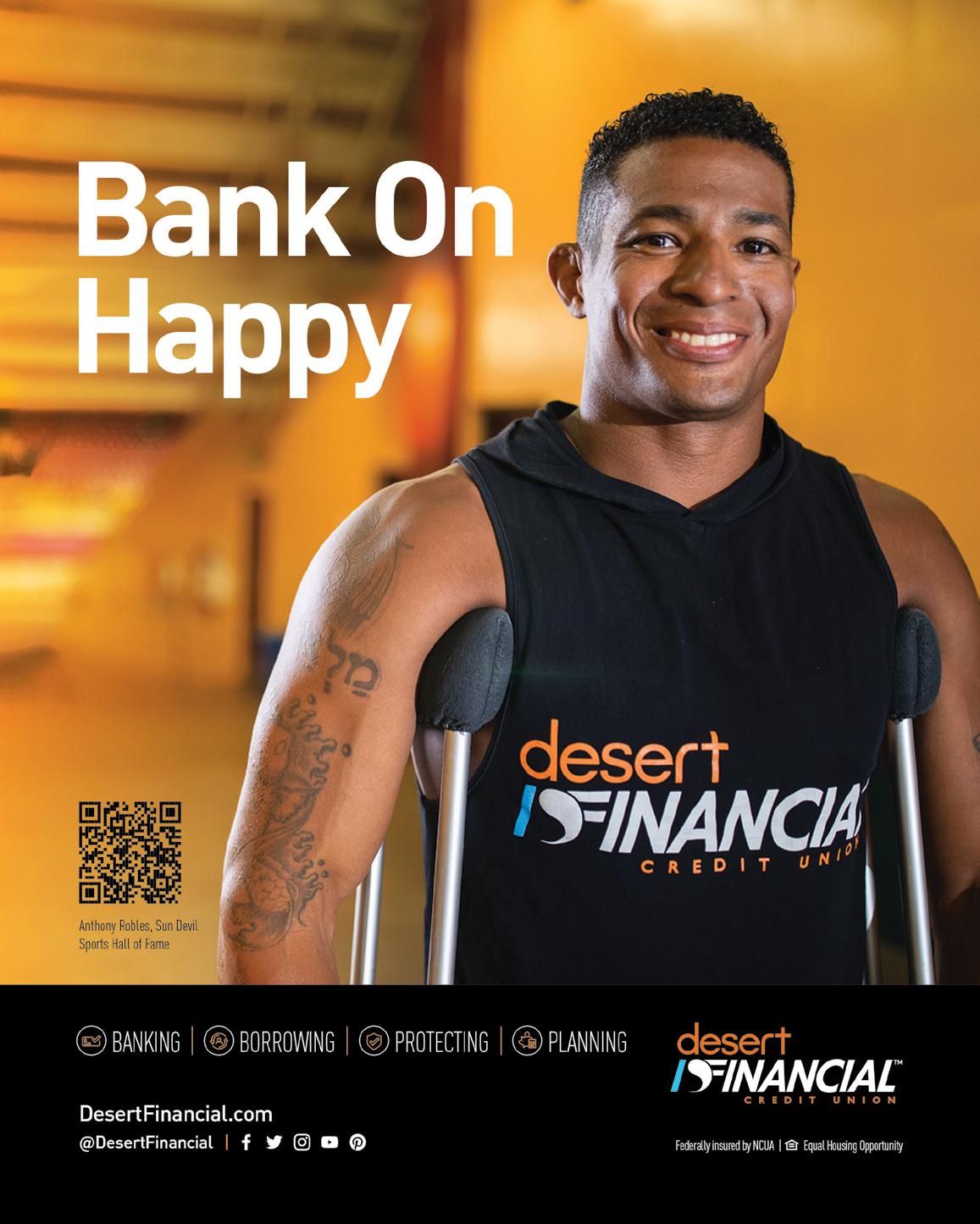
Contributors
Rachel Burgess
An assistant professor in management and entrepreneurship at the W. P. Carey School of Business, she focuses on employee identity, organizational justice and the work/non-work interface.
Sara Clemence
A reporter and writer and former travel editor for The Wall Street Journal, news director for Travel + Leisure and deputy business editor for the New York Post.
Craig Guillot
A business journalist, his work has appeared in The Wall Street Journal, Forbes, Chief Executive and Entrepreneur.
Sabira Madady
A student photographer from Afghanistan, she is pursuing medical studies.
Anna V. Smith
An associate editor for the High Country News Indigenous affairs desk, her work has appeared in outlets such as The New York Times, Audubon and Mother Jones.
Liz Stephens
A strategist at Desert Financial Credit Union and ASU grad, ’16 BA, ’22 EMPA, she oversees content to help people understand complex financial concepts.
On the cover: Melina TaCheenie, ’22 BFA in art (drawing); Connor Legg, ’22 BFA in art (painting), ‘22 BA in English (writing, rhetorics and literacies); and Katie Derwin, undergraduate student in art (intermedia).
The official publication of Arizona State University
Summer 2023, Vol. 26, No. 3
CHIEF BRAND OFFICER, PUBLISHER
Jill Andrews �97 BS, �03 MPA
MANAGING DIRECTOR, EDITOR
Lindsay Kinkade
MANAGING EDITOR
Kari Redfield
SENIOR ART DIRECTOR
Heidi Easudes
DIRECTOR, ASU NEWS
Penny Walker
DEPARTMENT EDITOR, COPY EDITOR
Leigh Farr
CREATIVE DIRECTOR, PHOTOGRAPHY
Dan Richards
DESIGNER
Tamara Kopper
PRODUCTION
Chris Myers, Jason Puckett
STORY IDEAS AND ADVERTISING INQUIRIES asuthrive@asu.edu
ASU THRIVE MAGAZINE PO Box 875011, Tempe AZ 85287-5011 480-727-5440 asuthrive@asu.edu news.asu.edu/thrive-magazine
If you would prefer to receive only a digital edition of the magazine or to unsubscribe, please update your subscription at: news.asu. edu/content/subscribe.
ASU Thrive (USPS 024-438; ISSN 1940-2929) is published quarterly by the Arizona State University Enterprise Brand Strategy and Management, PO Box 875011, Tempe, AZ 85287-5011, 480-727-5440. Subscriptions are sent to all ASU alumni. For detailed information about supporting alumni traditions, scholarships and programs, visit alumni.asu.edu/give-back/donate . Periodicals postage is paid at Tempe, Arizona, and additional mailing offices. Postmaster: Please send address changes to ASU Thrive, Attention: Circulation, PO Box 875011, Tempe, AZ 85287-5011. Permissions: Portions of this publication may be reprinted with the written permission and proper attribution by contacting the ASU Thrive editor.
ASU Thrive can be accessed online at news.asu.edu/thrive-magazine
Boldly step into your next chapter
Congratulations! You did it. You graduated and are commencing on the next phase of your journey. And you did it with help — from your family, your friends, your mentors, your professors, your classmates, your inspirations.
I am excited for the future — for your future. The rate and scale of positive change in all things has accelerated. Major innovations, some that your Class of 2023 will create, are changing the world for the better at an astonishing pace.
And because of the opening of our hearts and minds to other people and our acceptance of people different than us, the outcome — if we stay focused and work hard — is going to be something we’ve never seen before: unbelievable social and economic progress at the global level.
Here’s my message: Start realizing that all that negative energy out there is you being manipulated by somebody else, usually for a profit and usually for some reason that is not wholesome. Start realizing that the world is making progress and is moving forward in better ways and that you have this unique opportunity to take your new empowerment as a graduate of this institution and make it matter.
Know that even though you have graduated, we are always here for you. Lifelong learning is key for all of us. You probably already know after your time here that in addition to college degrees, ASU has learning options from K–12 to midcareer to post-retirement. More than 310,000 learners are gaining the technical and soft skills needed to succeed in today’s and tomorrow’s careers through the offerings from our Learning Enterprise. We aim to support you with career help, networking, films and workshops, artists’ exhibits, alumni events and more.
Congratulations again. Hopefully this issue’s stories of students and alumni making a difference in the world will inspire you to make a positive difference in the ways that only you can.
Michael M. Crow President, Arizona State University
twitter michaelcrow linkedin michaelmcrow INSTAGRAM asuprescrow FACEBOOK presidentcrow
ASU Thrive is printed on paper that is certified to the Forest Stewardship Council ® (FSC ®) Standards. ASU Thrive is paper neutral, replanting trees equivalent to paper usage in geographic areas of need.
CERTIFIED REFORESTED BX_CAFD2FCCC342 REFORESTED IN UNITED STATES CALIFORNIA ASU THRIVE MAGAZINE 1 COVER: FJ GAYLOR FOR ASU WELCOME


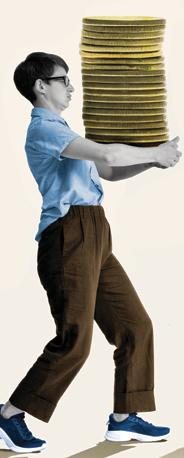
SABIRA MADADY/ASU; FJ GAYLOR youtube.com/ASU youtube.com/ASUathletics linkedin.com/school/Arizona-State-University linkedin.com/company/asualumni instagram.com/ArizonaStateUniversity instagram.com/ASU_alumni instagram.com/SunDevilAthletics Congrats graduates! May your celebrations continue. Go Calendar of events Populate your agenda with upcoming event highlights on ASU’s campuses. 4 Tap into learning resources for all stages of life. 6 Update in the news National Science Foundation awards grant for X-ray laser. 12 Lake Havasu celebrates 10th anniversary. 14 Advance your career Give your savings a boost 5 tips to keep in mind post-college. 18 How to stop longing for the path not taken: Researchbased strategies for moving forward when you’re dwelling on what might have been. 20 Commence on your journey Time capsule From Sparky’s 75th anniversary to President Crow’s 20th year, we recap what you loved, watched, laughed at and listened to. 24 Scholars around the world. 30 A performance to remember. 32 C reate change Greener
Tips to make your life more sustainable and meaningful. 36 Evidencebased ideas for greener living. 2 SUMMER 2023 FIND
living
Real-world research
Meet three graduating seniors who have taken what they’ve learned and applied it to solving problems. 42
3 economic trends for 2023: New jobs, cooling inflation, stabilizing housing prices. 46
Inspire others
Cool places to work
Alumni share how they landed their dream jobs and provide career tips. 50
Antony Aguilar, ’16 BS and ’22 PhD, works at Solestial, a startup focused on solar arrays for space.

Graduating fashion student Heidi Stierli (right) with her designs. She earned a New York City internship.

Please
twitter.com/ASU twitter.com/ASU_alumni twitter.com/TheSunDevils
JEFF
Next level From Montreal to Phoenix to New York, student lands opportunities in a fashion powerhouse. 56
like a Sun Devil Jon Rahm wins Masters and Phil Mickelson ties for second. 60
schedule for 2023:
ready for this year’s
Grow
and now: ASU’s West campus in the 1980s
BOOK-OPEN magazine.asu.edu pinterest.com/ArizonaStateUniversity facebook.com/ArizonaStateUniversity facebook.com/ASUalumni facebook.com/ArizonaStateSunDevils
Digital extras and the latest updates
NEWTON’; CAMILLE MISTY
Play
Football
Get
games. 62
Then
vs. today. 64
visit magazine.asu.edu for the digital magazine with embedded videos and links.
ASU THRIVE MAGAZINE 3
Check in to events to earn Pitchforks and rewards!
Sign in to Sun Devil Rewards in the ASU app for event listings, news, games and more. Earn and be rewarded! sundevilrewards. asu.edu
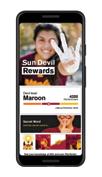
3D view into space
The Marston 3D Astronomy Show, led by the School of Earth and Space Exploration students and staff, features state-of-theart planetarium technology that uses 4,000 projection systems to create 3D stereographic renderings of Earth and space-related visuals. Learn about new opportunities on the moon, material return missions from asteroids and Mars, the deployment of an instrument to gather data from the moon of Jupiter, and the exploration of iron- and nickel-rich objects in the outer part of the asteroid belt.
June–August, Marston Theater, Tempe campus, ISTB4 sese.asu.edu/3d-astronomy Free Family

Spotlight on Latino art

“A pattern, a trace, a portrait: Four Artists from CALA Alliance’s Residency Program” showcases new and existing work by Carolina AranibarFernández, Diana Calderón, Estrella Esquilín and Sam Frésquez. These Latino artists each presents discrete installations that weave together universal themes of memory, loss and grief while highlighting issues related to place and the destruction of our natural environment.
Wednesday–Sunday through June 18, 11 a.m.–5 p.m., ASU Art Museum, 51 E. 10th St., Tempe, register by calling 480-965-2787
asuartmuseum.org
Free Family
June
Detail of Carolina Aranibar-Fernández, “El Desplazamiento y Las Flores,” 2021. Courtesy of the artist and Celebración Artística de las Américas Alliance.
SCHOOL OF EARTH AND SPACE EXPLORATION 4 SUMMER 2023 GO
Sun Devil Generations
Sun Devil Generations is a familyfriendly program designed for young Devils from birth to sixth grade. This is an opportunity to enjoy unique and memorable experiences while also cementing a lifelong relationship between the little Sun Devils in your life and your alma mater. Sun Devil Generations events take place throughout the year.
Click on the link to register for an event alumni.asu.edu/engage/ sun-devil-generations

Free Family
Sun Devil Send-Offs
Each summer, ASU Alumni chapters host regional Sun Devil Send-Offs with Sun Devil Celebrations occurring locally to meet and welcome incoming families and students to ASU. Somewhere between a pep rally and a maroonand-gold jubilee, send-offs help ease the transition to college for incoming first-year, international and transfer students.
July–August alumni.asu.edu
Free Family
‘Beetlejuice’

He earned his stripes on Broadway. Now the ghostwith-the-most is coming to Tempe. Based on Tim Burton’s beloved film, this hilarious musical tells the story of Lydia Deetz, a teenager whose life changes when she meets a recently deceased couple and a demon with a thing for stripes. With an irreverent book, an astonishing set and a score that’s straight out of the netherworld, “Beetlejuice” is a remarkably touching show about family, love and making the most of every Day-O.
Tuesday, Aug. 22–Sunday, Aug. 27, ASU Gammage asugammage.com
Family Ticketed
For alumni teachers
As the new school year comes to a start, the ASU Alumni Association wants to provide alumni educators with ASU swag to share their alma mater in the classroom. Requests for packs — filled with ASU-branded items — are accepted while supplies last.
Request a teacher pack alumni.asu.edu
Free
Aug. Visit asuevents. asu.edu for events. Visit thesundevils. com for athletics.
July
ASU THRIVE MAGAZINE 5 MARION RHOADES PHOTOGRAPHY
Mindfulness minis

The ASU Center for Mindfulness, Compassion and Resilience presents short, guided meditations you can easily work into your day. Start your week with intention by practicing a meditation on one of many topics such as self-care, muscle relaxation, unity and compassion to name a few — all under 20 minutes. mindfulnesscenter.asu.edu/meditations
Free Family
Peeking Inside the Black Box: How Do We Know When Science Can Be Trusted?
How can we know when to trust scientific research to inform our decisions about health and behavior? Participate in this behind-the-scenes investigation of the scientific world and learn how reliable research happens, how to spot pseudoscience and how to navigate the messy realities of scientific research. This course is taught by Kjir Hendrickson, professor at the School of Molecular Sciences. ASU alumni receive a free class (up to two sessions) with an Osher Lifelong Learning Institute membership.
Tuesdays, June 6, 13, 20, 27, 1–2:30 p.m., Tempe Public Library lifelonglearning.asu.edu
Ticketed Age 50+
Understanding Inflation and Its Nasty Cousins: Shrinkflation and Skimpflation

As countries around the world navigate rising prices of essential goods, inflation and its two nefarious cousins — shrinkflation and skimpflation — are rearing their heads. Join Hitendra Chaturvedi, a professor of practice in the Department of Supply Chain Management at the W. P. Carey School of Business, for this in-depth investigation of the causes and impacts of inflation, shrinkflation and skimpflation. ASU alumni receive a free class (up to two sessions) with an Osher Lifelong Learning Institute membership.
Fridays, June 16, 23, 1:30–3 p.m., Zoom lifelonglearning.asu.edu
Ticketed Age 50+ Online
Community 6 SUMMER 2023 GO
Wherever you are
Make the most of your alumni experience
Take advantage of ASU resources for your career, family, vacations and more. alumni.asu.edu/ services
Career
Soft skills, solid results
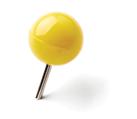
ASU CareerCatalyst has grown its new “Professional Skills for Everyone” series, adding “Collaboration” and “Workplace Culture” to an innovative portfolio of courses. Professional skills — or “soft” skills, including communication, emotional intelligence and teamwork — are critical for success in the workplace, yet many professionals haven’t had the opportunity to learn them in an educational setting — until now. careercatalyst.asu.edu
Online
Stay in the know
Update your info to receive invites to special events and more. alumni.asu.edu/ update
Linking together
When Sun Devils connect and help one another, great things can happen. Visit the official ASU Alumni LinkedIn page and search the ASU alumni network for local connections in your area. Locate new employment opportunities and find out what other ASU alumni are doing. alumni.asu.edu/ linkedin
Free Networking
Chapters
Network by finding your chapter
New grads: We’re here for you
We’re here to support you as you navigate the transitions ahead long after you graduate. ASU offers alumni access to career resources for life and has launched new and expanded resources for lifelong learning through ASU for You.
asuforyou.asu.edu
Events for budding and established entrepreneurs
From conferences to competitions, whether you are a small business owner or simply curious about entrepreneurship, events in the ASU community of business builders are a great way to grow your network and get plugged in. entrepreneurship.asu.edu/events

Free Networking
ASU Alumni chapters are a ready-to-join network to make new friends, make business connections and share Sun Devil Pride. Attend meetups to catch up with friends or make new connections. alumni.asu.edu/ chapters Free Networking
See asuevents.asu.edu for additional ASU events. ASU THRIVE MAGAZINE 7
FUTURE-PREPARED West Valley expansion
In the heart of the West Valley, the ASU West campus pulses with energy. For nearly 40 years, the campus has upheld its commitment to the 15 communities in west Phoenix, driving opportunities for learners of all ages. Home to 19 colleges, schools and departments, ASU West offers more than 125 undergraduate and graduate degree programs, including forensics, business, engineering, education and honors curriculum.

Today, ASU West is poised to accelerate the West Valley’s growing economy through workforce development, community resources and a robust talent pipeline. The campus will launch three new schools: the School of Technology, Innovation and Entrepreneurship, in the W. P. Carey School of Business; the School of Interdisciplinary Forensics, in the New College of Interdisciplinary Arts and Sciences; and the School of Integrated Engineering, in the Ira A. Fulton Schools of Engineering. The campus is adding a four-story, 55,000-square-foot academic building and a 134,264-square-foot, 500-bed residence hall.
Read more at campus.asu.edu/west
“What we’re doing on the ASU West campus is related to our design as the people’s university. We’re going to find a way for jobs for everyone and a path to dignity for everyone, in every possible way.”
— MICHAEL M. CROW, ASU PRESIDENT
8 SUMMER 2023

ASU THRIVE MAGAZINE 9 SAMANTHA CHOW/ASU Largest NSF grant in ASU history New groundbreaking X-ray laser being built. 12 Lake Havasu celebrates 10th anniversary. 14 Update in the news
ASU startup receives funding to advance fire-safe battery research
Recently, Safe-Li, an ASU startup that licensed breakthrough battery technology, earned acceptance into Shell’s GameChanger program and won $300,000 in seed funding. ASU Regents
Professor Jerry Lin, inventor of the technologies and chief scientist at Safe-Li, designed a patentpending technology for a unique coating method for battery manufacturing. The aim is to make batteries fire-safe, while improving battery performance.

Raincoats made of algae could be the future of sustainable fashion
Charlotte McCurdy wants to take sustainability to the next level. Instead of just buying less, she wants to create consumer products out of materials that are carbon negative.
McCurdy, an assistant professor of industrial design in The Design School at ASU, works at the intersection of research, design and sustainability. She teaches industrial design and a class titled Design for Ecology and Social Equity.
A few years ago, she created a translucent raincoat made of a carbon-negative, algaebased plastic substitute.

Called “After Ancient Sunlight,” the work was part of “Nature — Cooper Hewitt Design Triennial” in 2019, won the Experimental
category in 2019 Fast Company Innovation by Design and was shown at the Design Museum in London.
Algae is efficient at converting solar energy to stored chemical potential energy — so it sequesters carbon and is therefore carbon negative instead of carbon neutral.
For her contributions to greener living, McCurdy has been recognized as a sustainability innovator in a recent commercial for Genesis electric vehicles, which features her work on a dress created with top designer Phillip Lim as part of the ONExONE Conscious Design Initiative.
See the video at charlottemccurdy.com .
10 SUMMER 2023 CHARLIE LEIGHT/ASU UPDATE
Charlotte McCurdy creates “plastic” raincoats and sequins from algae polymer.
ShadowCam sends back images of moon’s darkest, coldest places
ShadowCam, an ASU-operated NASA instrument aboard South Korea’s Pathfinder Lunar Orbiter, reached the moon near the end of 2022. The camera can see into the moon’s permanently shadowed craters — places astronomers have never seen before. ShadowCam’s first image sees inside the Shackleton Crater, near the lunar south pole, and the instrument is now sending back more images so the ASU team can calibrate its systems in preparation for its mapping mission.

Space scientists say those shadowed craters, some of the coldest places in our solar system, may contain water ice. Principal Investigator Mark Robinson, a professor in ASU’s School of Earth and Space Exploration, says the big question is, “How much water?”
“We have hints that [deposits are] there from much lower-resolution experiments,” Robinson says. “But the picture’s really fuzzy. So we’re trying to sharpen the picture down to the scale of a meter.”
Students assist medical companies as part of ASU, Mayo Clinic program
Hugo Dominguez will soon hire for his medical instrument company, Abanza Tecnomed, and he already has someone in mind: Ryan Ellazar, a graduating senior in the Edson College of Nursing and Health Innovation, who has been shadowing Dominguez as part of the ASU and Mayo Clinic MedTech Accelerator program. The accelerator pairs students to serve as interns with medical instrument companies.
The program is a win-win for the companies and the 11 student interns. More at mayo.asu.edu
Intel grants allow ASU professors to expand, diversify microelectronics workforce

Semiconductor chip manufacturer Intel is helping boost the number and diversity of semiconductor workers through its Broadening Participation in Science and Engineering Higher Education grant program. Trevor Thornton and Hongbin Yu, both professors of electrical engineering in the School of Electrical, Computer and Energy Engineering, are using the Intel grant to provide hands-on semiconductor experience to students at ASU and the Maricopa Community Colleges.
Robinson and his team have been operating the camera from ASU’s Science Operations Center since 2009. He says it will take six months to a year for ShadowCam to generate enough images to draw conclusions. See the latest at sese.asu.edu .
Keep up with the headlines at ASU
by subscribing to the ASU News e-newsletter at news.asu.edu/ subscribe
Thornton and Zachary Holman, an ASU associate professor of electrical engineering, will coordinate eight internships at ASU facilities and four open positions in a new summer Research Experiences for Undergraduates program in partnership with the National Science Foundation. Thornton and his collaborators will recruit students from their classes at both ASU and the Maricopa Community Colleges — each are U.S. Department of Education-designated HispanicServing Institutions.
“Companies like Intel are building huge factories in metro Phoenix and around the country. We need a skilled workforce to work here.”
TREVOR THORNTON, PROFESSOR OF ELECTRICAL ENGINEERING
ASU THRIVE MAGAZINE 11 NASA/KARI/ASU; SAMANTHA CHOW/ASU
The Marvin crater interior is in permanent shadow; the exterior is not permanently shadowed.
ZOOMING IN National Science Foundation awards largest grant in ASU history for X-ray laser
The National Science Foundation is awarding ASU $90.8 million in funding — the largest NSF research award in the university’s history — to advance groundbreaking research in X-ray science. The NSF award will support a five-year project to build the world’s first compact X-ray free electron laser, or CXFEL. This one-of-a-kind, room-sized X-ray laser instrument will fill a critical need for researchers to explore the intricacies of complex matter at atomic length and ultrafast time.
The CXFEL will allow scientists to observe biology’s molecular processes in detail — important for understanding human health and developing new medicines and drugs. It will also help investigators advance renewable energy research, quantum technologies and semiconductor manufacturing. It shrinks the technology’s size and cost so it can be housed in a university, medical or industrial setting. Learn more at biodesign.asu.edu/cxfel

The world’s first compact X-ray free electron laser “will give us a new tool to look at medical science and semiconductors and all kinds of imaging in different ways.”
12 SUMMER 2023 CHARLIE LEIGHT/ASU UPDATE
— WILLIAM GRAVES, CXFEL PROJECT CHIEF SCIENTIST
Using X-ray light to reveal COVID-19’s secrets
One aspect of SARS-CoV-2 that makes it so infectious and challenging to control is its ability to outwit the body’s immune defenses. A new study examines NendoU (pronounced nenn-doh-YOU), a viral protein responsible for the virus’s immune evasion. The structure of this crucial protein is explored in detail, using a technique known as serial femtosecond X-ray crystallography.
The Biodesign Center for Applied Structural Discovery, which has made critical advances in structural studies of this kind, is directed by Petra Fromme, a Regents Professor in ASU’s School of Molecular Sciences and the lead investigator of the study. Funding was provided by a grant from the National Science Foundation and the BioXFEL Science and Technology Center.
Trust but verify for better AI
A team at ASU’s Center for Accelerating Operational Efficiency is testing a tool to help the U.S. government acquire artificial intelligence technology that people feel confident using. The project is starting with TSA officers.
“If you believe that our values in the U.S. will lead us to do more good than harm to the world, then we have to remain competitive in these high-tech areas like AI,” says Erin Chiou, an assistant professor of human systems engineering in The Polytechnic School, one of the Ira A. Fulton Schools of Engineering.
Removing forever chemicals from drinking water

Researchers at the university have developed a new method that helps microorganisms destroy PFAS. The technology may prove to be more effective than other technologies.
Data compiled by the Environmental Working Group reveals that PFAS lurk in the drinking water of more than 200 million Americans, or more than 60% of the country’s population. The compounds may take hundreds or even thousands of years to break down. They also linger in the human body.
The first use of PFAS was as the nonstick agent in Teflon in 1938, and they’ve since been added to fast-food packaging and countless household items.
NendoU, a protein used by the SARS-CoV-2 virus to hide from the immune system.
“This work is so exciting as it shows for the first time that the differences in flexibility of the protein play an important role in the functional mechanism,” Fromme says. “This will be critical for development of drugs against NendoU, with potential to reveal the presence of the virus to the immune system, which can then react and hinder serious infections.” Learn more at biodesign.asu.edu/appliedstructural-discovery
Chiou leads a project funded by the U.S. Department of Homeland Security measuring the trustworthiness of AI systems using nine criteria organized into a Multisource AI Scorecard Table.
Products coated in PFAS resist sticking and staining because of their unique chemical composition, made by fusing carbon and fluorine atoms. Other molecules can’t break that bond. But this also means the chemicals are nearly indestructible.

“The carbon fluorine bond is the strongest known carbon bond in chemistry,” says Bruce Rittmann, Regents Professor in ASU’s School of Sustainable Engineering and the Built Environment.
Rittmann is the director of the Biodesign Swette Center for Environmental Biotechnology. There, he and his research team have discovered an unorthodox way to break PFAS down — by introducing them to a team of microorganisms that act like PFAS assassins.
ASU THRIVE MAGAZINE 13
ASU LOCAL ASU at Lake Havasu celebrates 10 years
Shortly after the onset of the Great Recession, a Lake Havasu middle school sat vacant, and the city needed revitalization. Its citizens saw opportunity in higher education. They raised $2 million, a generous donor matched their efforts and an ASU college location was born. City council members, business officials, local dignitaries, and ASU faculty and staff celebrated the 10th anniversary last February.
ASU at Lake Havasu offers high-demand degree programs and more than a dozen full-time faculty. It also announced ASU Local at Lake Havasu, a hybrid college program that pairs in-person coaching and mentorship with those looking to earn a bachelor’s degree.

CHARLIE LEIGHT/ASU UPDATE
Director Carla Harcleroad, center, and Sparky are joined by faculty, staff and community leaders at Lake Havasu’s celebration.
14 SUMMER 2023
$5.5M to help alleviate Arizona’s nursing crisis in Lake Havasu and in the Valley
A $5.5 million grant to ASU from the Arizona Department of Health Services will result in a new cohort of 104 nurses starting this summer and graduating in summer 2024. Fully 80% of the grant will be used for scholarships for tuition and fees for 104 students who commit to staying and practicing in Arizona for four years.

“Our goal is to have the students getting experience there to stay there,” says Judith Karshmer, dean of ASU’s Edson College of Nursing and Health Innovation. Karshmer also says diversity will be important in selecting students for the cohort.
Edson College has the infrastructure to handle the additional students on the Downtown Phoenix and West campuses, and a Polytechnic campus location opening this fall. The college also opened a location two years ago at ASU in Lake Havasu.
Email AcceleratedBSN@asu.edu for more information.
Effects of choline deficiency on health
Choline, an essential nutrient produced in small amounts in the liver and found in foods including eggs, broccoli, beans, meat and poultry, is a vital ingredient for human health. A new ASU-led study explores how deficiency in dietary choline adversely affects the body and may be a missing piece in the puzzle of Alzheimer’s disease.
It’s estimated that more than 90% of Americans are not meeting the recommended daily intake of choline. The current research suggests that dietary choline deficiency can have profound negative effects on the heart, liver and other organs, and is also linked with Alzheimer’s disease.
Learn more at biodesign.asu.edu .
Downtown residential hall renamed for former Phoenix Mayor Phil Gordon
The university renamed its residence hall on the Downtown Phoenix campus from Taylor Place to Gordon Commons in honor of former Mayor Phil Gordon, a driving force behind the creation of the campus 20 years ago.
“I’m grateful that you took a risk on an idea that downtown could be revitalized by welcoming ASU into the neighborhood. Or that downtown could be the heart of the city – the government, economic, cultural, business, entertainment and residential heart of the city,” says Gordon, who was mayor of Phoenix from 2004 to 2012. He earned a law degree from ASU in 1978.
When Gordon and Crow hatched the plan for the campus, they envisioned a complete reimagining of the city’s core, with an ASU hub attracting creative people who would build a knowledge and technology industry.

Crow says he and Gordon were focused on one thing: “Could Phoenix, as an emerging city in this unbelievable democracy of the United States – could it be this shining place? Could it be a city where everyone was equal? Could it be a city where economic progress was for everyone? Could it be a place where anyone could have access to a great public university?”
Gordon had pushed the idea of a downtown campus during his campaign, and after he took office in 2004, he and Crow wanted to move at light speed – welcoming students by fall 2006.
“Stepping up to care for the communities we serve is part of the bedrock of who we are as a university.”
— ASU PRESIDENT MICHAEL M. CROW
Nursing faculty member Mandy Kwon, left, helps fourth-year BSN student Hannah Meredith at ASU at Lake Havasu.
ASU THRIVE MAGAZINE 15 JASON DREES/ASU; CHARLIE LEIGHT/ASU

FUTURE FOCUSED Being the change
With a dual major in mechanical engineering and global health, Katie Sue Pascavis graduated in May 2023 with honors from Barrett, The Honors College. She had near-perfect grades and won a Goldwater Scholarship, a Udall Scholarship, and a Marshall Scholarship, one of only 40 students nationwide; it has an acceptance rate of 4%. She also secured two U.S. utility patents. Here’s her advice on finding your mission and managing a busy schedule.

1. For balance, “Knowing when to step back and understand that maybe you put too much on your plate. Prioritize.”
2. For finding your mission, “We’ve been given so much, so I think that finding ways to make a difference and give back is good advice for finding your purpose.”
3. Remember, no matter your age, you can make a difference. “Some of the best advice I’ve received is, ‘You’re not too young.’”

ASU THRIVE MAGAZINE 17 SABIRA MADADY/ASU Give your savings a boost 5 tips to keep in mind post-college. 18 How to stop longing for the path not taken Researchbased strategies. 20
Advance your
career
Give your savings a boost
Story by LIZ STEPHENS, ’16 BA, ’22 EMPA
IT MIGHT SEEM daunting after college to start saving money, but doing so will help you build wealth, thanks to the power of compound interest, and allow you to better forecast your future. Here are five easy-to-follow money-saving tips to help you get to financial security.
1. Create a budget
To create a budget, first, find out what your actual income is after taxes. Search for an online calculator to help you. Then, subtract your total living expenses from your true income. The typical percentage-based budget recommendation is 50/30/20 for needs, wants and savings, but with rising housing costs, consider other budgets like 70/20/10 and 80/20.
With every paycheck you receive, pay your savings first. The easiest way to do this is via direct deposit or automatic savings.
5 tips to keep in mind post-college

Every month, take a moment to track and categorize your expenses. You can use a budgeting app or download a template to help you track costs all in one place and identify spending patterns.
2. Cut unnecessary expenses
If you are looking for more ways to save, examine your spending patterns to see where you can reduce. If you eat out a lot, try cooking at home more. If you have multiple recurring subscriptions, eliminate those least used.
Lastly, ask yourself these questions before taking the plunge and making a purchase:
How often will I use this in the next six months to a year?
Do I want this item, or do I need it?
Making changes to your spending can
18 SUMMER 2023
ADVANCE
add up and help you save for your future.
3. Save for emergencies
Situations like a car repair or a medical bill can wreak havoc on your finances. Set aside monthly money into an emergency fund to avoid debt if an expense pops up. Depending on your situation, three to six months of living expenses are ideal, but at minimum, aim to save at least $1,000 for an emergency in a high-yield savings account. Putting money aside for emergencies can provide you peace of mind and reduce financial stress.
4. Manage debt
You might have heard of “good” and “bad” debt. Try to avoid highinterest debt by paying off your credit cards in full each month by the due date.
If you have existing debt, identify areas where you can reduce spending to allocate more money toward paying off the debt. A popular strategy like the snowball — paying off the smallest loans first quickly — is also used to pay down debt.
If you have multiple highinterest debts, consider consolidating for a better interest rate. Debt can be overwhelming and complicated, but do not worry. Ask to speak to someone at your financial institution to get started.
5. Invest in your future
Different ways exist to begin investing, from real estate to individual stocks to bonds. If you are just starting your career, prioritize your 401(k) or IRA to start taking advantage of compound interest.
In simple terms, compound interest means that you earn interest not only on your initial investment but also on the interest your investment earns
Learn to manage your money effectively
over time. Because of this, putting even a tiny amount of money away every month as early as possible in your career can make a big difference in your bottom line. Additionally, find out if your organization participates in 401(k) matching to help boost your retirement savings. It’s free money!

Before you start investing, research or consult with a financial advisor to ensure you’re making smart investment decisions.
You can use many strategies to save money and build your savings over time. By following these tips, you’re setting yourself up for financial success. Remember, saving money is a journey; small steps can create significant results. n
Liz Stephens
The content strategist at Desert Financial Credit Union oversees the development of all external content to help people understand complex financial concepts. She is passionate about the community, empowering people of all ages to make informed decisions and increase their financial literacy and wellness.
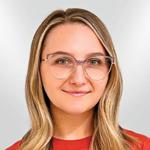
ASU THRIVE MAGAZINE 19
Desert Financial Credit Union online for educational content to increase financial wellness at desertfinancial. com/news-and-knowledge.
Visit
Rachel Burgess
Rachel Burgess is an assistant professor in the Department of Management and Entrepreneurship at the W. P. Carey School of Business. Her research focuses on employee identity, organizational justice and the work/non-work interface.
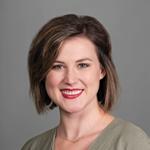
How to stop the path not taken longing for

CAREERS CONSIST OF many choices. Sometimes, you may find yourself longing for the life you might have had if you had made a different choice — the forgone career role.
In my research, my colleagues Jason A. Colquitt, the Franklin D. Schurz Professor in the Department of Management & Organization at the University of Notre Dame’s Mendoza College of Business, and Erin C. Long, the assistant professor of management at the University of Georgia Terry College of Business, and I focused on how dwelling on the notion of “what could have been” can affect employees. We focused on what employees, managers and organizations can do to minimize the negative consequences of that reflection.
For the paper, published in the Academy of Management Journal in February 2022, we surveyed more than 300 U.S. employees to try to understand how they experience and react to forgone identity dwelling, or ruminating on what could have been. We focused
on their emotions and the resulting behaviors they engaged in at work. Our results represented a wide variety of current and forgone identities — social workers who could have been veterinarians, architects who could have been painters, and teachers who could have been attorneys.
In response to forgone identity dwelling, participants longed for the life they might have had. For example, one participant recounted trading a future as a scientist for a career in finance. While happy in his financial career, he said he often thinks about the possible fulfillment he might have found in this forgone identity.
That longing led to withdrawal in the participants and reduced the amount of help they offered their co-workers. While many respondents said they were happy with how their lives turned out, the longing for what could have been kept them from being fully invested and effective in their current jobs. As these findings indicate, forgone identity dwelling is detrimental not only for individual employees but
for the workplace as well. So, what can you do if you feel this way? What can managers do?
1. Craft your job to make it more fulfilling.
First, our research showed that people who respond to longing for the road not taken with job crafting, or shaping current work roles to make them more fulfilling, were less withdrawn and more likely to help their co-workers. And it boosted their productivity and job satisfaction.
Although some careers are better suited for job crafting than others, it’s almost always possible to find a way to incorporate your passion into your work role.
For instance, the social worker who thought about becoming a
20 SUMMER 2023 ADVANCE
Research-based strategies for moving forward when you’re dwelling on what might have been
veterinarian could use service animals to help clients dealing with trauma, allowing her to use her love of animals at work. Likewise, a salesperson who gave up a career as a travel writer could work with international clientele, allowing opportunities to travel while still in a stable, high-paying profession.
In addition to your own proactive approach, managers play a role. Managers can identify their employees’ interests and passions and look for ways they can incorporate them into employees’ work roles. For instance, managers can make an effort to tailor roles or assign projects based on the kinds of work employees find most fulfilling.
Naturally, not all jobs can be tailored to a specific individual,
but even small changes can help increase job satisfaction and productivity.
2. Cultivate the belief that what happens is because of your own actions.
Second, try to cultivate an internal locus of control, or the tendency to believe that what happens in life is due to your own actions, as opposed to luck or chance. Our findings showed that people with an internal locus of control respond less negatively to forgone identity dwelling.
To create a sense that you control your destiny, try taking ownership of your past career choices. Focus more on why you made those decisions rather than where you could be today. Reflect
on the parts of your life you are grateful for. Research has shown that gratitude improves mental and physical health and resilience to adversity.
It’s natural to wonder what might have been. But to stay productive and fulfilled, move past the longing for that alternative life and learn to embrace the life you have. n This article has been adapted from a Harvard Business Review feature.

ASU THRIVE MAGAZINE 21
Learn more
to the full article and other business news and insights at news.wpcarey.asu.edu .
Link
Sheilah Utley, ’22 BA in theater and a minor in music theater, and Tanner J. Conley, ’22 BA in theater, celebrate their graduation in December at Sun Devil Stadium.
FORKS UP
Let the celebration begin! It’s time to celebrate your amazing achievements: your projects, your relationships and a degree — all earned with your creativity, determination and possibly a fair amount of caffeine.

22 SUMMER 2023
Commence on your journey
2019–23 time capsule
We recap what you loved, watched, laughed at and listened to. 24 Scholars around the world ASU students who earned top scholastic honors.
30
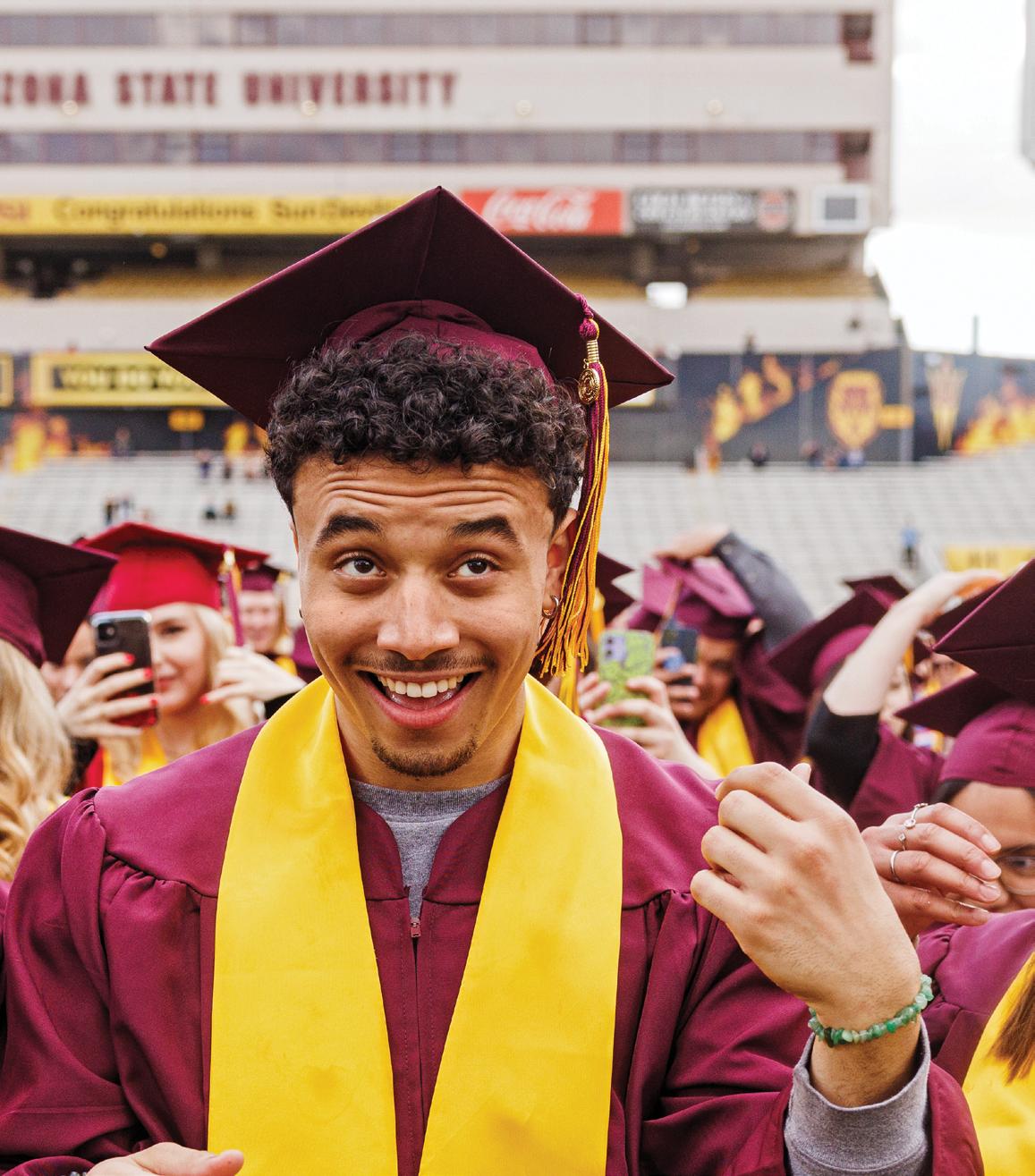
ASU THRIVE MAGAZINE 23 FJ GAYLOR FOR ASU
2019–23 time capsule
It has been a wild four years, graduates! Here’s a look back at some defining college moments, pop culture and historical happenings from your ASU journey.
Miss Latin America is a doctoral Sun Devil

Nancy Gómez, ’18 MA in Spanish, wins the Miss Latin America of the World crown in 2019 —all while pursuing a PhD in Spanish.
The King in the North
Long-running HBO series

“Game of Thrones” ends with its eighth season, with … mixed reviews about the finale. Might be hard to remember now, but people were … displeased.

Throw it back with the 10-Year Challenge
The #10YearChallenge, inviting people to look back at themselves and see the “glow up,” goes viral — even gets a shoutout from Cardi B in the “Thotiana” remix.
PBS NewsHour West launches

It broadcasts from the ASU California Center in Los Angeles for the first time. It’s still going strong. pbs.org/newshour/about/ newshour-west
Greta’s big speech
Greta Thunberg turns heads at the Climate Action Summit, furthering her environmental activism credibility. It helps lead to her becoming 2019’s Time Person of the Year.

World’s largest canine cancer vaccine trial
Meet Trilly, a 9-year-old Gordon Setter who receives a shot that may contain the first vaccine intended to prevent cancer. Trilly is one of 800 dogs participating in Professor Stephen Albert Johnston’s study.
 B Y RENAE HINTZE, ’17 BA; OMAR MOTA, ’19 BSD; KAITLYN MATTHEWS, ’21 BA JOURNALISM AND MASS COMMUNICATION; JORDAN MOFFAT, ’21 BA SPORTS JOURNALISM; RAINI-SKYE ROGERS, GRADUATING SENIOR IN GRAPHIC DESIGN
B Y RENAE HINTZE, ’17 BA; OMAR MOTA, ’19 BSD; KAITLYN MATTHEWS, ’21 BA JOURNALISM AND MASS COMMUNICATION; JORDAN MOFFAT, ’21 BA SPORTS JOURNALISM; RAINI-SKYE ROGERS, GRADUATING SENIOR IN GRAPHIC DESIGN
20 1 9
24 SUMMER 2023 HELEN SLOAN/HBO;
LEPISTO/UW-MADISON COMMENCE
@REESEWITHERSPOON; NANCY GÓMEZ; STEFAN MÜLLER; MEGHAN
We love Hayden Library
It’s back! Open and renovated, the library, originally built in 1966, shows off its $90 million upgrades on Jan. 13.

Hollywood VR storytelling comes to ASU
Leading virtual reality company Dreamscape Immersive and ASU team up, merging movie-style storytelling with virtual reality to deliver fully immersive VR learning systems.

‘Parasite’ wins big at the Oscars
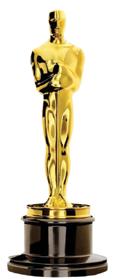
In an upset over frontrunner “1917,” the movie takes Best Picture, making it the first foreign language film to land the biggest prize in all of the Oscars’ 92 years.
Send-off
Supreme Court Justice Ruth Bader Ginsburg, Civil Rights icon Sen. John Lewis, Black Panther star Chadwick Boseman, and Kobe Bryant and his daughter Gigi all pass away.

ASU goes remote
To stop the spread of the virus and keep one another safe, students, faculty and staff officially begin the at-home work and study life. Graduation is virtual, but grads find ways to celebrate together.

Medical community volunteers help distribute free saliva-based tests.
In addition to on-campus COVID-19 testing, 71 public testing sites pop up around Arizona designed by ASU and administered by the Arizona Department of Health Services.


‘A’ goes blue
To thank and honor front-line workers, medical professionals and first responders, students and faculty paint the “A” blue.
On everyone’s watchlist
“Tiger King,” “Love is Blind,” “The Queen’s Gambit,” “The Mandalorian.”
20 20
ASU THRIVE MAGAZINE 25 VICTORIA WILL/INVISION/AP; JEFF NEWTON; AMDREWCS81/WIKIMEDIA COMMONS
Former presidential candidate Bernie Sanders sparks a meme frenzy after sporting his mittens at the presidential inauguration.
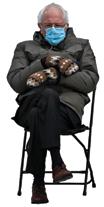
A devil of a life
Nov. 20 marks 75 years since Sparky the Sun Devil was born at ASU. Forks up!

California love
ASU welcomes fall 2021 students to its first-ever event in the historic Herald Examiner Building in downtown Los Angeles — the site of ASU’s California Center. The site integrates higher education and job opportunities in the local LA community.

NFTs — we’re all confused

Described as “the Mona Lisa of baseball cards,” by outlets like by Stadium Talk, the sale of milliondollar non-fungible tokens (that’s what NFT stands for, by the way) dominates headlines as a new form of fine art collecting. And later, it will crash in value.
James Webb Space Telescope launches

It’s the largest, most powerful and complex space telescope ever built. Celebrating ASU’s involvement, the university hosts a live launch event on Zoom with Regents Professor Rogier Windhorst and a team of ASU postdoctoral scholars, and undergraduate and graduate students. Today, stunning images from galaxies 320,000 light-years away and beyond captivate us all.
Sticking it to COVID-19
Finally, there’s a light at the end of the tunnel: a vaccine for the virus. Sun Devils
Bones or no-bones day?
Noodle the pug forecasts the mood of the day by hopping up in bed or flopping over.

join millions of people across the U.S. in rolling up their sleeves to fight the pandemic at pop-up vaccination sites on all four metro Phoenix campuses.
Fast football start
In the first game of the 2021 football season, ASU intercepts the ball off on Southern Utah’s first drive. Then the team drives it into the end zone on the first offensive play of the season. Touchdown!
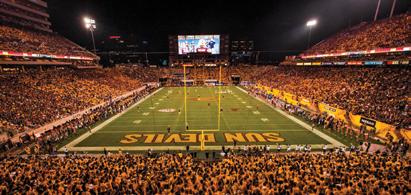
Film school renamed after an icon
ASU renames its film school after legendary actor and filmmaker Sidney Poitier, a national hero and the first Black man to win the Academy Award for best actor.
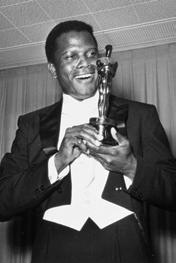
20 21
The Bernie Sanders mitten meme
26 SUMMER 2023 THE NEW YORK TIMES; @JARETKELLY; NOUNS.WTF; NASA; SNAP/SHUTTERSTOCK COMMENCE
Hubble is starry-eyed
NASA’s Hubble Space Telescope establishes a new benchmark: detecting the light of a star that existed within the first billion years after the Big Bang. ASU’s Rogier Windhorst and Francis Timmes co-author the finding in a scientific paper.
‘The Great Resignation’
Two-plus years into the pandemic, we “just can’t” with work anymore. More than 4 million Americans quit their jobs. Also dubbed “the Big Quit,” this mass exodus is thought to be a result of the pandemic causing people to rethink their careers, work conditions and long-term goals.
ASU at the Arizona Capitol

Local lawmakers get a firsthand glimpse into ASU’s work impacting the future of Arizona and the world. ASU faculty and students display their advances in medicine, engineering and space exploration, using dog DNA to solve crimes, reviving civic studies in K–12 classrooms, Arizona’s Water Blueprint and more.
Free at-home rapid tests

The Biden administration
announces Americans can begin ordering free at-home COVID-19 rapid tests. Orders are taken online and over the phone for the tests.
Air filters for Valley schools

Using donated materials, Sun Devil volunteers help construct Corsi-Rosenthal boxes to treat the air in K–12 classrooms and protect local schools against the spread of COVID-19. Inexpensive but effective, the boxes are built from supplies available at most home and improvement stores. Students assemble them during “box-a-thons” on ASU’s Tempe campus.
President Crow’s 20th year
When Michael M. Crow came to ASU, he came in with a whirlwind of ideas about how to revolutionize higher ed to make it more inclusive and more responsive to the world’s challenges — and started executing on them immediately. Summarizing how he changed the university in 20 years? No easy feat. But The State Press gives it a go in “The Crow Issue.”

Wordle mania
A word game created by British software engineer Josh Wardle gets everyone using desktops to game again. The New York Times buys this latest craze for upward of $1 million — and we still play it to this day.

20 22
ASU THRIVE MAGAZINE 27 THE NEW YORK TIMES
By the numbers #ASUgrad
19,664 total applicants for graduation with all degrees in the spring Class of 2023.
13,372 undergraduate students to receive their degrees.
6,294 graduate students to receive their graduate degrees
48.5% from Arizona
Almost 50% of the spring Class of 2023 hails from Arizona.
Ceremonies
List of special interest convocations: graduation. asu.edu/ceremonies/special
Full schedule of ceremonies: graduation.asu.edu/ ceremonies/latest
Source: ASU Registrar Services. These numbers are as of April 24, 2023.
23
Desmond Cambridge Jr.’s half-court buzzer-beater takes down No. 7 Arizona
In front of a crowded stadium, in the season’s last game of the year against Arizona, the Sun Devils prevailed — with a 60-foot shot that landed at the buzzer. Wow! Do those moments even happen outside the movies? Relive it online at thesundevils.com and search Cambridge and buzzer.

Super Bowl AZ
Arizona hosts football’s main event for the fourth time. And the Kansas City Chiefs barely beat the Philadelphia Eagles in an exciting competition. Kudos if you had in-stadium seats. If not, there’s always commercials, snacks and camaraderie.

College credits on YouTube
In a fun and cost-effective partnership, ASU and the Green brothers join forces to offer some intro classes on YouTube that can be transferred into any college that accepts accredited credits. Darn, we wish we would have, could have. Well, we’ll tell our younger siblings all about it.
Rihanna photo goes viral
ASU student Dominic Contini’s photo of Rihanna performing “Diamonds” at the halftime show wins hearts. The Cronkite student and social media producer shot the image with a Canon R5 with 70-200 lens. The photo hits more than 900,000 views on Contini’s own social media account and gets major media and celebrity shoutouts.

And we’re off!
Forks up and caps in the air. We made it. Commencement. And almost 20,000 grads walked across stages to accept diplomas, ready to continue making the world better in our own unique ways.
20
28 SUMMER 2023 @DOMCONTINI COMMENCE


ASU THRIVE MAGAZINE 29
Scholars around the world
This year, ASU is among only nine other doctorallevel institutions that were recognized as top performers in the number of both Fulbright students and scholars. The university was named along with Harvard University, Penn State and others in this distinction, and is the only Arizona university to be named a top producer of both scholars and students.
In addition to Fulbright winners, ASU has been raising its profile with other elite awards. In the 2023 award cycle, seniors Nathaniel Ross and Katie Sue Pascavis were awarded the Rhodes Scholarship and Marshall Scholarship, respectively, making ASU one of only three public universities to produce winners of both prestigious awards. Here are ASU students who recently earned the world’s top scholastic honors.
Argentina
Yoko Chavez
Fulbright U.S.
Student Program
Australia
Lily G. Deakin
Gilman Scholarship
Brazil
Miriam Carpenter-Cosand
Critical Languages
Scholarship
Madeleine Ryan
Boren Scholarship
Celeste Zuniga
Fulbright U.S. Student Program
Canada
Benjamin Ambrose
Killam Fellowship
Jordyn Hitzeman
Killam Fellowship
Maria Cornejo-Terry
Killam Fellowship
Czech Republic
Scott Devereux
Gilman Scholarship
Costa Rica
Kallee Schwann
Barrett Global Explorers
Grant, also studying in the Dominican Republic
Denmark
Paul-Gabriel Pagay
Also France, U.K.
Gilman Scholarship
Finland
Claire Agee
Fulbright U.S. Student Program
France
Ebani Acedo
Gilman Scholarship
Blanca V. Aguiar
Gilman Scholarship
Anastasiya Andreyeva
Gilman Scholarship
Francesca Marie R.
Maglalang
Gilman Scholarship
Jalen McClellan
Gilman Scholarship
Angelica Pentland
Gilman Scholarship
Georgia
Christian Shousha
Critical Languages
Scholarship
Germany
Isabelle Abbas
DAAD-Rise
Christina Bell
DAAD-Rise
Teddi Burgess
Gilman Scholarship
Tianna Chemello
DAAD-Rise
Shrey Garg
DAAD-Rise
Kyleigh G. Gates-Haas
Gilman Scholarship
Miriam Goras
DAAD-Rise
Julia Greteman
DAAD-Rise
Jasmin Falconer
DAAD-Rise
Piper Heiligenstein
DAAD-Rise
Rylee James
DAAD-Rise
Chloe Leff
DAAD-Rise
Mariah McNally
DAAD-Rise
Cameron Morgan
DAAD-Rise
Samihan Muppirala
DAAD-Rise
Eliana Watson
DAAD-Rise
Olivia Wyatt
DAAD-Rise
Ghana
Talia Rodriquez
Fulbright U.S. Student Program
Iceland
Tasnia Hossain
Gilman Scholarship
Ireland
Esther Almazan
Fulbright U.S. Student Program
Iceland United States Canada Mexico Costa Rica Peru Brazil Argentina Fr Ireland Oxfo United Kingdom
30 SUMMER 2023 SOURCE: ASU LORRAINE W. FRANK OFFICE OF NATIONAL SCHOLARSHIP ADVISEMENT COMMENCE
Steven Braswell
Gilman Scholarship
Ava Ethridge
Gilman Scholarship
Italy
Rachelle Davila
Gilman Scholarship
Tanner A. McDonald
Also Germany and Denmark Gilman Scholarship
Grecia Pacheco Padilla Gilman Scholarship
Skylar Urich Gilman Scholarship
Japan
Alexandra Finitzer
Gilman Scholarship
Jasmine Gajewski
Gilman Scholarship
Angus McVicker Mendez
Critical Languages
Scholarship
Dallin Richardson Gilman Scholarship
Kazakhstan
Kristina McCarthy
Fulbright U.S. Student Program
Mexico
Cristian Payan
Fulbright U.S. Student Program
Valeria Perez
Barrett Global Explorers Grant
Mongolia Wen Wendt
Fulbright U.S. Student Program
New Zealand
Savanna Lee Gilman Scholarship
Norway
Miriam Goras
Fulbright U.S. Student Program
Peru
Shaniece N. Randolph
Gilman Scholarship
South Korea
Alicia Maynard Briones
Gilman Scholarship
Brittany Duran
Fulbright U.S. Student Program
Lady Pace Gilman Scholarship
Spain
Joseph Larson Nevarez
Gilman Scholarship
Lizbette A. Ramos
Gilman Scholarship
Taiwan
Noah Byrd Boren Scholarship
Danielle Brister
Fulbright U.S. Student Program
Bailey Q. Hardt
Gilman Scholarship
Armando Hernandez
Critical Languages Scholarship
Danika Kartchner
Fulbright U.S. Student Program
Payton Morlock
Gilman Scholarship
Raymond Ortiz Boren Scholarship
Gilman Scholarship
Sidney Ortiz
Gilman Scholarship
Emma Strouse Boren Scholarship
Camille C. Thompson
Gilman Scholarship
Madeleine Zheng Boren Scholarship
Thailand
Jose Miguel Santos
Gilman Scholarship
Taylor L. Yates Gilman Scholarship
United Kingdom
Alyssa Cortez
Fulbright U.K.
Summer Institutes
Fulbright U.S. Student Program supports independent study or research, teaching, graduate study or artistic practice abroad. Sponsored by the U.S. Department of State’s Bureau of Educational and Cultural Affairs, it is the largest and most prestigious educational exchange fellowship program in the world.
The Gates Cambridge Scholarship provides full-cost scholarships to outstanding applicants from countries outside of the U.K. to pursue postgraduate degrees in any subject at the University of Cambridge. The award recognizes outstanding intellectual ability, leadership potential and a commitment to improving the lives of others.
The Marshall Scholarship enables intellectually distinguished young Americans, anticipated to be the country’s future leaders, to study in the U.K. so they may gain an understanding and appreciation of contemporary Britain and act as ambassadors.
Brittney N. Farrow Gilman Scholarship
Venus Kapadia
Gilman Scholarship
Gabrielle Mills
Gates Cambridge Scholars
Ntombizodwa Makuyana
Gates Cambridge Scholars
Alexander Sojourney
Marshall Scholarship
Elizabeth
Truckenbrod-Hart Gilman Scholarship
Virtual
Melissa Moreno Gilman Scholarship
New Zealand Australia Thailand Taiwan Ghana Japan Mongolia Kazakhstan Italy Spain Finland Czech Republic
Cambridge South Korea Norway France
rd
Germany
Denmark
ASU THRIVE MAGAZINE 31 GRAPHICS: RAINI-SKY ROGERS, ’23 BA IN GRAPHIC DESIGN
LIVING THE DREAM A performance to remember
Before she completed her undergraduate studies, Caelan Creaser, ’19 BMus in performance (musical theater), performed professionally in several acting roles, including “Thoroughly Modern Millie,” at the Hale Centre Theatre, for which she won 2017 AriZoni Best Actress.
After graduation, she began performing with the Disney Broadway “Frozen” North American tour as an understudy for Elsa and member of the ensemble. The production brought her to ASU Gammage for a two-week run this past February.
From August 2019 to March 2023, Creaser performed as Elsa about 60 out of 400 shows. As part of the ensemble, she sang and acted eight to 10 times a week. The demanding schedule requires resilience and strength, she says, and she credits the ASU music theater program, including the mentorship of several professors, for helping set her up for success. Another key, Creaser says, were opportunities at the ASU Music Theater New York City Showcase, where students audition for NYC agents.

“I don’t believe in good luck in this industry, but I do believe in opportunity meets preparedness, and I think that ASU prepared me to be the best version of myself that I could be at that time,” Creaser says.
Creaser says performing on stage for an audience is magical. “I was a little girl when I saw my first Broadway musical, and I just remember being in awe. I was overwhelmed in the best way possible.”
Learn more at caelancreaser.com
Caelan Creaser, ’19 BMus in performance, in her role in the ensemble for “Frozen.” She was also an understudy for the Elsa role.
32 SUMMER 2023 DEEN VAN MEER/DISNEY THEATRICAL PRODUCTIONS
COMMENCE

BUILT FOR IMPACT Engineering water solutions
To keep water flowing in the desert and all regions experiencing climate change, decision-makers need the right information. They rely in part on experts in hydrology, the study of water and its movement and relationship with the environment on and below the Earth’s surface.
That’s where ASU’s Center for Hydrologic Innovations comes in, one way ASU is bringing together researchers, utilities, government agencies and industry. Together, they are developing new software tools, algorithms and visualization approaches for improved monitoring and forecasting water supply.
“Through applied engineering projects, the folks we’re working with and working for have a say in the development of products that they can immediately use,” says Enrique Vivoni, the center’s director and a senior global futures scientist with the Julie Ann Wrigley Global Futures Laboratory and a professor of hydrosystems engineering in the Ira A. Fulton Schools of Engineering.
Each project uses a collaborative solution space, where all partners involved work together to develop a tool that is immediately applicable to a real-world issue.
“It’s a fairly new way of doing work in engineering,” Vivoni says.
Learn more about ASU’s contributions to water research and solutions at chi.asu.edu
To keep water flowing in the desert, ASU researchers are collaborating with industry and government partners to develop new ways to monitor and forecast the water supply in the Phoenix metro area.
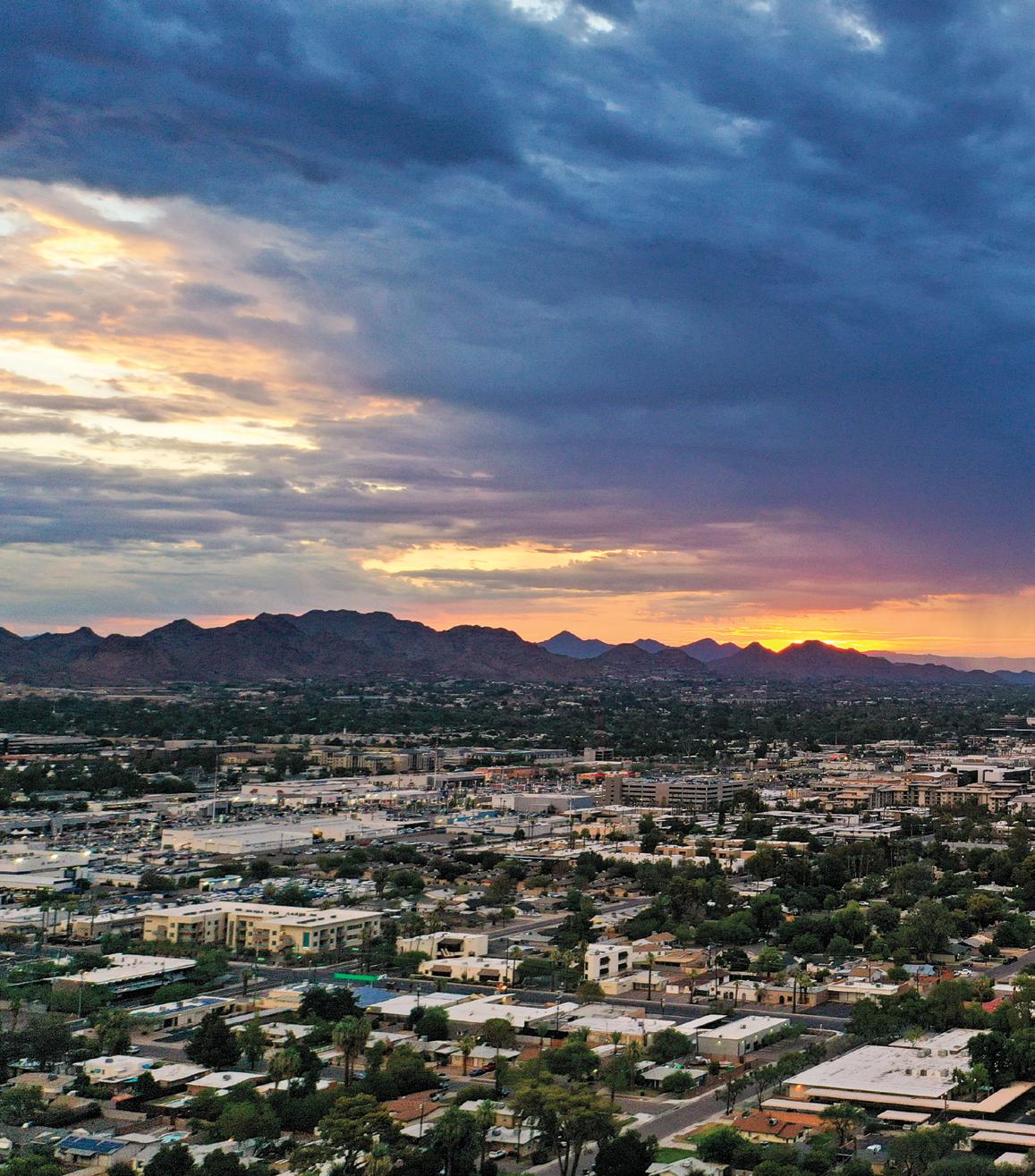
34 SUMMER 2023
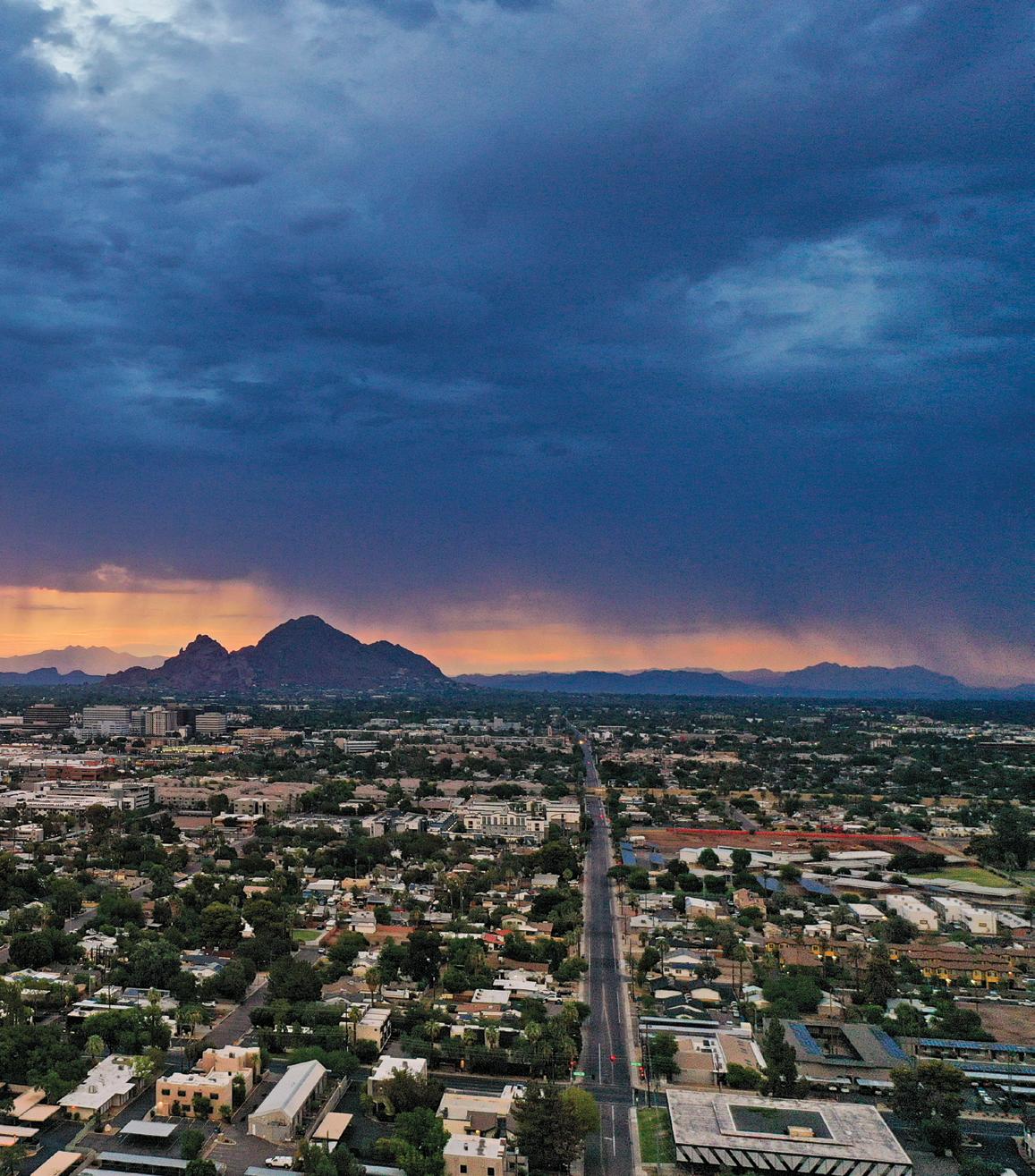
ASU THRIVE MAGAZINE 35 DEANNA DENT/ASU
Create change
“While our work is global in impact, we begin with local partners in Arizona and the Western U.S. where water is a vital resource for society.”
Greener living Tips to make your life more sustainable and meaningful. 36 Real-world research Meet three graduating seniors who have taken what they’ve learned and applied it to solving problems. 42
— ENRIQUE VIVONI, FULTON PROFESSOR OF HYDROSYSTEMS ENGINEERING
Buy locally grown food when possible
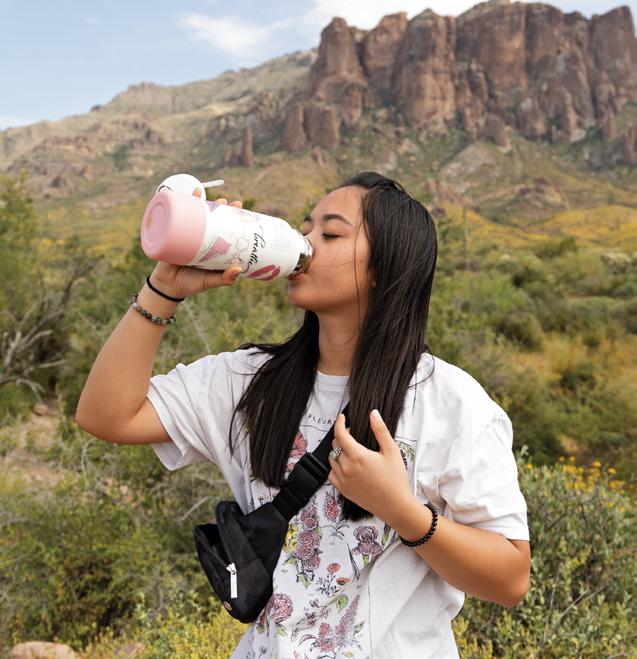
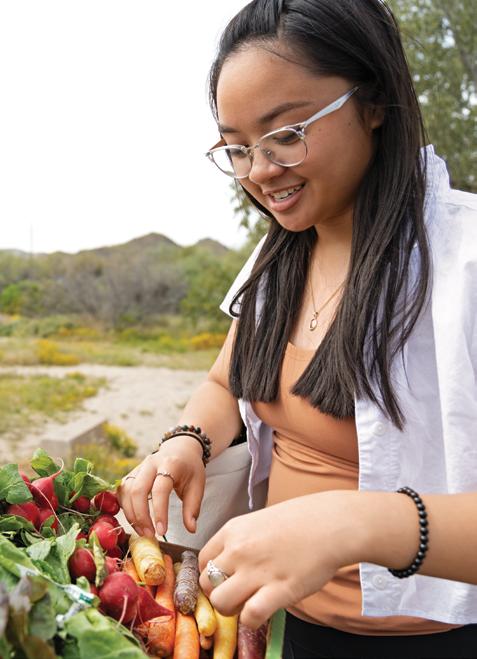
Drive less
Reuse and buy fewer things
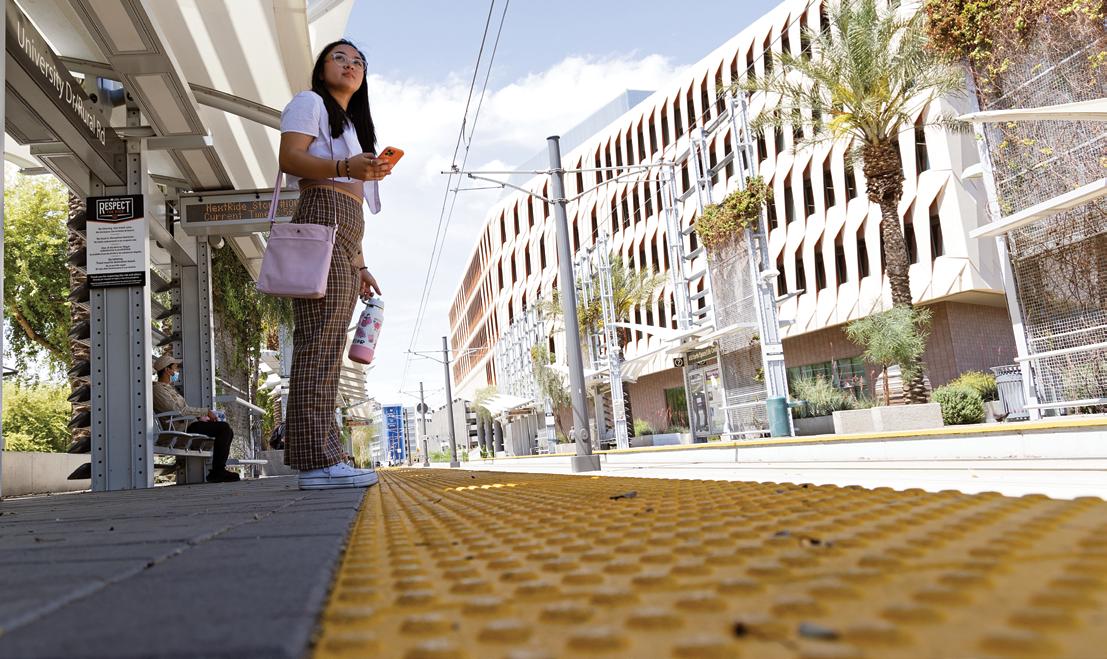
Gre ener
36 SUMMER 2023 CREATE
Story by ANNA V. SMITH
Photos by SABIRA MADADY
Bike and walk more
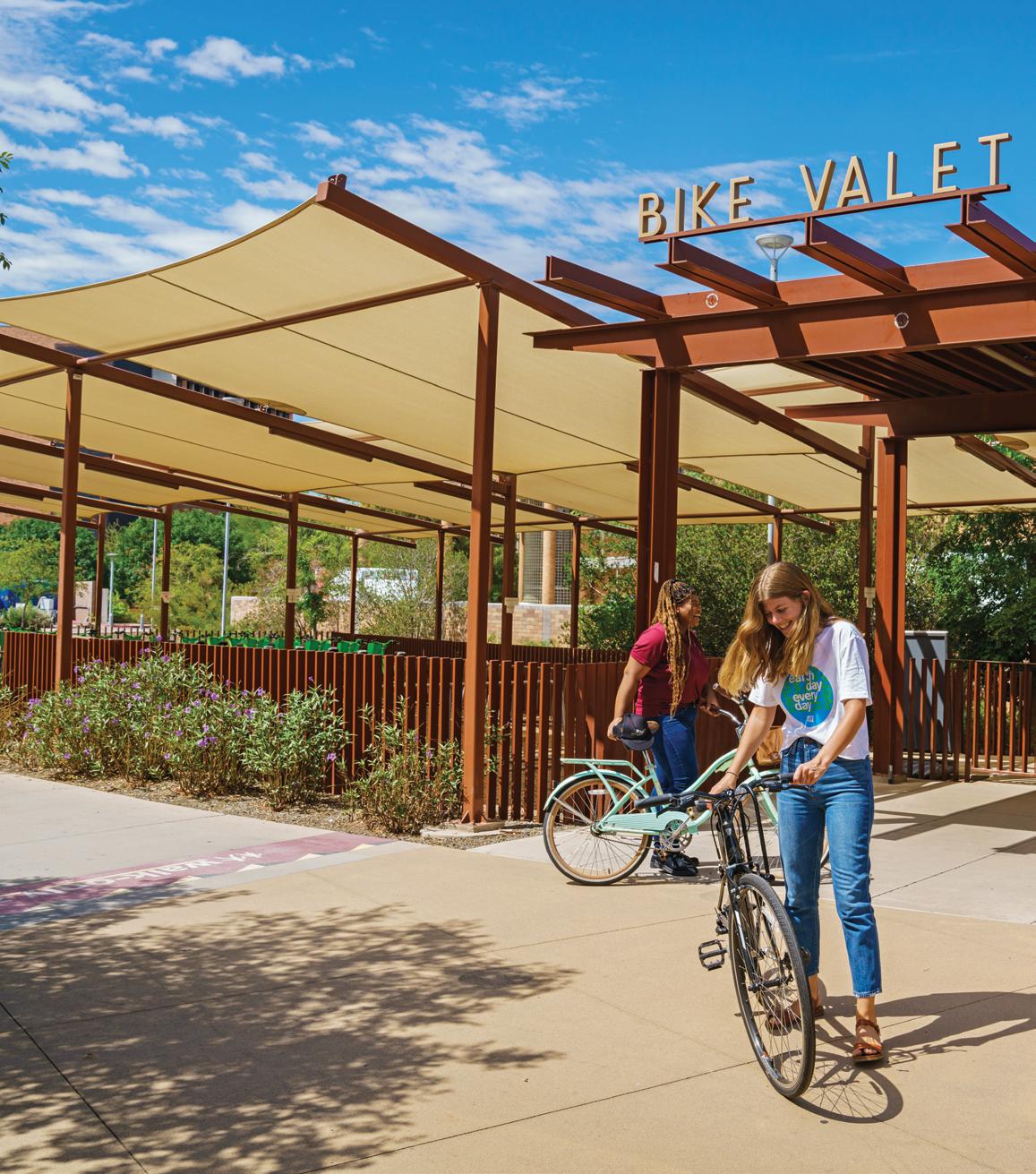
living
ASU THRIVE MAGAZINE 37
Tips to make your life more sustainable and meaningful
EMMANUEL PADILLA/ASU
By now, you know
many basics when it comes to environmental-friendly tips: Use less water, recycle, turn off the lights. But you also know that those alone won’t solve the environmental problems we face, like a warming planet, drought and biodiversity loss.
How do you balance the recognition that we must help usher in systemic solutions while still making impactful changes?
In part, it’s about seeing the limits and possibilities of both. Personal habits collectively add up. Meanwhile, policies, organizations and governments only change when enough people do something about it.
“Sustainability is actually trying to address climate problems. It’s not just describing the problem, it’s figuring out what we should do,” says Diane Pataki, Foundation Professor and director of the School of Sustainability, a program within the College of Global Futures.
“You need to understand the science,” Pataki says, “but it’s now moving past describing the way the world is and figuring out: What should we do? What should the future look like?”
To begin, start with a list:
What are you doing in terms of sustainability in your own home, at work, in your community?
Then, consider the advice below from scientists in the School of Sustainability, and build from there.
At home
What makes a true difference is figuring out what you can do as a regular practice, and commit to it.
Try to walk or bike more and drive less. Buy locally grown food when possible. Avoid fast fashion and overall buy fewer things.
Consider making household changes, like an energy audit of your house that can be provided for free by your utility company, or updating old appliances with energyefficient ones.
For water-saving tips, add aerators to your faucets and use low-flow showerheads.
These tips also help lower your bills, and while there’s a bigger upfront cost for some of them, federal and state tax credits for solar panels and heat pumps for your house can help.
These smaller actions across society matter and help create “sustainability,” as well as happiness and self-care, something Scott Cloutier, assistant professor in the School of Sustainability, says often gets overlooked.
How happiness relates to sustainability
Cloutier studies the connections between happiness and sustainability. Research has shown that buying more things does not lead to long-term happiness, instead leading to overconsumption.

Connect to the ecosystem outside your household
38 SUMMER 2023
Izie Figueroa studies graphic design at the Herberger Institute for Design and the Arts and makes time in her schedule to reconnect with nature as part of her self-care.
“For me, sustainability is an internal process of understanding how we relate to the world, how we see the world outside ourselves, and then asking ourselves how those relationships we develop contribute to an equitable, just, sustainable, regenerative future,” Cloutier says. “The happiness angle is that you can find synergistic ways of living that do make you happy and regenerate the environment, rebuild soil health and reestablish community connections.”
A good example of how to do that is a straightforward one: Grow a garden of any size, maybe in a community garden or in place of a water-thirsty lawn, Cloutier says.
Gardening has been shown to boost mental health and overall well-being, along with the ecosystem benefits it provides to native insects, pollinators and birds. Added up around the world, backyard gardens provide 15% to 20% of the world’s food.

ASU THRIVE MAGAZINE 39
“The happiness angle is that you can find synergistic ways of living that actually do make you happy and actually regenerate the environment, rebuild soil health and reestablish community connections.”
— SCOTT CLOUTIER, ASSISTANT PROFESSOR IN THE SCHOOL OF SUSTAINABILITY
Cloutier’s research has also found gardening to be a meaningful way to connect to the community and ecosystem outside your household.
“That is when you see the power of how growing food can move through and inspire community, in the way that it brings people together and reconnects us to nature,” Cloutier says.
Gardening also connects to composting, either at home or at the municipal level. When organic materials like food waste or yard trimmings get into landfills they emit methane, a potent greenhouse gas. In 2018, food waste accounted for 21% of municipal solid waste, according to the Environmental Protection Agency. Worldwide, food waste accounts for 8% of humancaused greenhouse gas emissions, which makes preventing food waste and diverting it from landfills a critical piece of addressing climate change.
At work
Another place to think about sustainability changes is at work, school, your HOA or while volunteering.
Increasingly, organizations are establishing goals and programs toward sustainability like emissions reduction, net zero waste, or renewable energy that you could be a part of. Or, they may not have a program yet, but would be willing to support one, or have goals but no concrete plan with how to achieve them. Finding out more about your own workplace, school or HOA provides a first step to impact the sustainability footprint of something bigger than your own household.
While career pathways around sustainability used to be limited, people with sustainability skills are in high demand right now, Pataki says. Over the past five years in the energy sector alone, jobs growth has increased 237%. But you don’t have to work in a sustainabilityfocused job to make a difference or to help guide your community in taking science-based actions, Pataki adds.
In the community
To better understand your environment, start with learning about whose ancestral lands you’re living on and what tribal nations are connected to them. Follow that up by getting familiar with what issues nearby tribal nations face. ASU’s American Indian Policy Institute holds talks and events on these types of topics and welcomes all. Understand the systems around sustainability and how they impact your community and others. Because while it’s simple to support renewable energy over coal, Lydia Jennings, who

is Wixárika and Yoeme and a postdoctoral research scholar in the School of Sustainability, says it’s important to ask “sustainable for whom?”
As a soil microbiologist and environmental scientist, Jennings studies the impact of mining on soil and how mines like the Rosemont Mine in southern Arizona affect tribes. Renewable energy relies on extractive industries like mining for lithium and copper, which means one region’s ability to use wind or solar is reliant on the use of land and minerals from another. Understanding the trade-offs and who might be impacted is a key part of environmental justice that makes up sustainability, Jennings says.
Still, the science is clear that society must move to decarbonize. Learning about the nuances and how to make this equitable matters, and scientists across the university study climate-social justice. Public events like film screenings, sustainability walking tours and book talks offer opportunities to
40 SUMMER 2023
Learn about tribal nations connected to the ancestral lands you are living on
meet other, like-minded people while you get informed.
You can then put that and other science-based learning about sustainability to use by becoming involved in local decision-making. Lots of questions around housing, transportation and environmental justice get decided locally, Pataki says.
“People often don’t recognize the power a small group of individuals can have in that process at the local level by just showing up,” she says. “Even showing up while still continuing to learn is critical.”
Start by figuring out what local issues matter to you, and what city council members and initiatives support them, and what politicians listen to and collaborate with scientists, Pataki says.
One evidence-based finding to come out of Pataki’s Urban Greening Lab is that reducing air pollution, “a matter of life or death,” Pataki says, requires more public transportation and electric vehicles, to start. This is the surest way to
Stay up to date on local issues, including housing

improve human health in cities: by eliminating pollution at its source.
Envision the future
Lastly, envision the future that you want, and then talk about it, Pataki says. Make space for conversations with family and friends, in community spaces or church groups, and get into the specifics: What does a sustainable society look like to you, as an individual, based on your values and your experience? How does that society work? What does it look like for your specific community?
Talking about the future is a hopeful act, since there is room to impact it through your decisions, big and small.
“Most people are overwhelmed by the fact that they feel we’re very far from sustainability, which is true, but we have to have a lot more conversation about the alternative,” Pataki says. “This is how humanity makes progress: We envision a future that’s different than what we have today.” n
Global Futures alumni make an impact across sectors
All parts of the economy, from research and design to government and finance, are seeking to fill a gap in sustainability knowledge. College of Global Futures alumni are contributing at organizations including:

Amazon, Apple, Microsoft, The Nature Conservancy, U.S.
Department of Energy, World Wildlife Fund, Salt River Project, Environmental Protection Agency, HP, Arizona
Department of Water Resources, Persefoni, Starbucks, Tesla, PetSmart, NASA, CDP, IBM, Jones Lang LaSalle
3,341 total graduates including spring ’23.
$75K average salary for undergraduate degree holders
$110K average salary for graduate degree holders
Learn more at collegeofglobalfutures.asu.edu/ careers/career-paths .
ASU THRIVE MAGAZINE 41
Realresearch world
Meet three graduating seniors who have taken what they’ve learned and applied it to solving problems
Story by MONIQUE CLEMENT, ’09 BA
AND KARINA FITZGERALD, ’18 BA, ’20 MA
Photos by ERIKA GRONEK, ’97 BA, ’03 BA
42 SUMMER 2023 CREATE
Some students say they chose ASU so they could work on realworld research with faculty who are top in their fields. Whether in engineering, sustainability, pre-med, veterinary science, physics, space or any number of fields, university students can get involved in solving problems early. Here, three graduating seniors discuss their projects, from artificial intelligence in K–12 to more sustainable cement to a new circuit that uses less energy and computes faster, and why they matter and how these opportunities set them up for success on their next journeys.
Susanna Westersund, making concrete more sustainable Graduating civil, environmental and sustainable engineering student Susanna Westersund worked on a project aimed to make concrete more sustainable while also reducing plastic pollution.
As Westersund points out, the environment faces the overaccumulation of plastics. Additionally, “concrete production is one of the leading causes of carbon dioxide emissions in the atmosphere, so replacing some of the cement with plastic particles is better for the environment,” she says.
Westersund’s project as part of the Fulton Undergraduate Research Initiative built on the work already done to alter and treat polyethylene plastic to add to cement mixtures.

“I chose this project because I am interested in the sustainable materials that can be used in civil engineering,” Westersund says. “The biggest thing I have noticed since being in this program is that I now see applications of things I am learning in my classes.”
In addition, the project helped her gain experience collaborating with other team members in labs.
“When I go into job interviews, I have the ability to talk about my project and how I have applied myself outside of class,” Westersund says.
Working with her faculty mentor, Christian Hoover, an assistant professor in the School of Sustainable Engineering and the Built Environment, proved invaluable, she says. In 2022,
Hoover won the National Science Foundation Faculty Early Career Development Program Award, which comes with $600,000 in funding to pursue research. Westersund says she gained confidence in herself and her abilities as an engineer while conducting research under Hoover.
“One of the best pieces of advice I have gotten from my mentor Professor Hoover is to trust in my abilities,” Westersund says. She encourages students to engage with research opportunities at ASU. “I have met many different faculty members and students who have given me connections, and I have learned about other projects, as well,” she says.
ASU THRIVE MAGAZINE 43
“I have met many different faculty members and students who have given me connections, and I have learned more about other projects as well.”
— SUSANNA WESTERSUND
semester, Jose Gonzalez-Garduno, a graduating senior in the Ira A. Fulton Schools of Engineering computer science program, developed a project to explore how AI technologies in K–12 classrooms can benefit both students and educators.

“AI isn’t just changing how STEM courses are being taught in school — it’s changing the whole education sector and how it operates,” Gonzalez-Garduno says.
He and other students accepted into one of ASU’s research opportunities, the Lincoln Center research program, shape their projects through close consultation with Erica O’Neil, center research
back when he began at community college in order to gather credits before transferring to ASU in fall 2019, where he became a student in Barrett, The Honors College. While maintaining high grades and carrying out real-world research, he also worked full time for five years in order to help support himself and his family.
A focus of his research so far has been how to use AI applications in K–12 classrooms so that technologies act like an interactive tool that enhances human capacities, Gonzalez-Garduno says.
“Research in intelligent tutoring systems investigates things like gamification, such as completing
challenges to earn prizes or achievements. These different types of motivations can further students’ development and ultimately have a positive impact,” Gonzalez-Garduno explains.
“Unfortunately, it starts becoming a problem in regard to how privacy
“My current research is looking at these two components, and whether the positives outweigh negatives, and how these improvements can help further the education field and how students benefit from it.”
What’s next?
He plans to go on to a master’s program in computer science, and hopefully also to earn his PhD.
“It’s going to be a whole new journey for me as a first-generation college student,” Gonzalez-Garduno says. “I’m also looking forward to getting a job as a software developer and seeing the difference that I can make within these tech companies by seeing how we can create new technologies that positively impact society.”
44 SUMMER 2023
“AI isn’t just changing how STEM courses are being taught in school — it’s changing the whole education sector and how it operates.”
—JOSE GONZALEZ-GARDUNO
Sritharini Radhakrishnan, testing a circuit component that retains memory without power
Graduating electrical engineering senior Sritharini Radhakrishnan has been working to improve neuromorphic computing, which tries to mimic the brain’s use of neurons and synapses. Conversely, traditional computing, sometimes called von Neumann computing, uses separate CPUs and memory units. Brain-inspired computing more closely mimics the structure of the human brain, in which memory and “processing” are combined. This structure can drive advances in machine learning and AI by building more energy-efficient, scalable and adaptive computer systems, Radhakrishnan says.

Her work tested a certain type of memristor, a new type of electric circuit component that retains memory even without power. It is part of ongoing research that seeks to find out if hexagonal boron nitride, a layered 2D material, proves promising for implementing
brain-inspired circuits.
“Everyone in the field aims to advance neuromorphic computing to the point that any device using the current von Neumann computing architecture can be replaced with a neuromorphic one. To achieve such a goal, it is vital to show that the neuromorphic computing scheme is competitive with the von Neumann one by demonstrating that neuromorphic circuits can carry out complex operations faster and with greater efficiency,” Radhakrishnan says.
By investigating the performance of hexagonal boron nitride for memristor devices, Radhakrishnan hopes to make this next-generation computing architecture a reality for data-hungry applications that current systems struggle to do efficiently.
Radhakrishnan says she is excited to have worked on a “truly cutting-edge” field that will impact the computing systems humanity needs to solve complex problems.
“By working on this research as an undergrad, I was able to get a head start in gaining technical know-how and experience to significantly contribute to any engineering research in my career,” she says. n
ASU THRIVE MAGAZINE 45 Get involved as a student Find out about numerous research opportunities for students at provost.asu.edu/uresearch Learn more about the Fulton Undergraduate Research Initiative at furi.engineering.asu.edu . Check out opportunities at Lincoln Center for Applied Ethics at lincolncenter.asu.edu .
“By working on this research as an undergrad, I was able to get a head start in gaining the technical know-how and experience to significantly contribute to any engineering research in my career.”
— SRITHARINI RADHAKRISHNAN
3
economic trends for 2023
New jobs, cooling inflation, stabilizing housing purchase and rental prices
Story by CRAIG GUILLOT
The Grand Canyon state continues to rebound from inflation and shows significant economic growth. Several Arizona cities lead the nation as the fastest-growing, while Arizona’s health care, manufacturing and science industries rank among the top in the country for job quality and gains, says Dennis Hoffman, director of the L. William Seidman Research Institute at the W. P. Carey School of Business and director of ASU’s Office of the University Economist.
With that in mind, here are three trends to watch in 2023.
More jobs
Over the years, Arizona built a diverse economy. That’s still true, and today’s state unemployment rates hit near 40-year lows in 2022 with job growth of 3.8%.

What’s next? More new jobs from nearshoring, tech manufacturing and the semiconductor industry, Hoffman says.
“We are winning many battles on the business relocation front,” he says. “Manufacturing facilities are expanding, not just the high-tech ones but many in the automotive supply chain related to electric vehicles.”
46
2023 CREATE
SUMMER
The Phoenix metro area saw the highest inflation rates in the nation between October 2021 and October 2022, Hoffman says — and Arizonans felt it.

Lower inflation Housing prices down by 25%
Fortunately, price increases are slowing and prices for some goods will come down throughout 2023.
“As a result of rapid price appreciation here in recent years, our inflation rate will moderate faster than in other states,” Hoffman says.
Housing has become an issue in the Valley, says Rashad Shabazz, associate professor in the School of Social Transformation and the School of Geographical Sciences and Urban Planning. And no wonder, as the median sale price for a Phoenix home rose from $325,000 in January 2021 to $404,300 by October 2021.
Some positive news, Hoffman says, is that rising mortgage rates have pushed down real estate prices. While Hoffman doesn’t project a downturn like 2007, he says, “Prices should fall about 25% off their peak. Rental rates will cool in line with housing prices, although the pace will be slower.”
Stay connected
Go to neweconomy.asu.edu to learn more about the changing Arizona economy.
ASU’s Project Humanities periodically hosts roundtable panels about housing and other topics affecting local communities. Learn more at projecthumanities.asu.edu
TIAN/ASU
ASU THRIVE MAGAZINE 47
XINYUAN
The chemistry of dance and science

It may seem unusual to pair science and dance, but that’s exactly what faculty member Keith Thompson is doing.
Thompson, assistant director of the dance program and associate professor at ASU, collaborated with the Facility for Rare Isotope Beams and Wharton Center for Performing Arts at Michigan State University to create an interactive multimedia project that educates the community on the intersection of art and science. The program involved graduate students, physicists, dancers and a cast of diverse youth.
Thompson says it’s important to emphasize diversity. He cited studies that show how girls and students of color often lose interest in sciencerelated programs as early as eighth grade.
The event, called “Of Equal Place: Isotopes in Motion,” included performances, movement workshops and hands-on science experiences. It was inspired by ASU Herberger Institute Professor Liz Lerman’s work with the European Organization for Nuclear Research facility in Switzerland. Dance Exchange, the arts organization Lerman founded, also collaborated on the project by performing as well as developing study guides for students.
The event, which was years in development, pushed groups together who otherwise may not often collaborate and learn from each other — much like the facility itself crashing particles together and studying those interactions to learn and better understand the universe.
“We are trying to expand the idea about who gets to dance and about who gets to be a scientist.”
— KEITH THOMPSON, ASSISTANT DIRECTOR OF THE DANCE PROGRAM AND ASSOCIATE PROFESSOR
MOVEMENT
48 SUMMER 2023
— BENJAMIN ADELBERG, JUNIOR MAJORING IN JOURNALISM AND MASS COMMUNICATION

ASU THRIVE MAGAZINE 49 COURTESY OF WHARTON CENTER INSTITUTE FOR ARTS & CREATIVITY/HJ SEELEY Cool places to work Alumni share how they landed their dream jobs and provide tips. 50 Next level From Montreal to Phoenix to New York, student lands opportunities in a fashion powerhouse. 56 Inspire others
Cool
TO work places

50 SUMMER 2023
INSPIRE
In her second year at ASU, Laurie Leshin (second from right) landed a summer internship at NASA in Houston. She now leads NASA’s Jet Propulsion Laboratory.
Alumni share how they landed their dream jobs and provide career tips
Story by SARA CLEMENCE
What makes a job great?
It’s not the money or the prestige — though they don’t hurt.
It’s about a job fitting for your passions and personality. About being able to do more work you love than work you don’t.
These alums have positions that make people sit up and take notice. But more impressive than their roles is how well-suited they are to them. From a solar engineer to a NASA leader, these alumni explain how they reached their dream jobs — and share advice for your journey.

ASU THRIVE MAGAZINE 51
Laurie Leshin, NASA’s JPL
Laurie Leshin, ’87 BS in chemistry, is director of NASA’s Jet Propulsion Laboratory, the world’s leading center for robotic space exploration. Its motto: “Dare mighty things together.”
“It’s pretty much hair on fire every single day,” Leshin says. “It’s sort of the highest highs and the lowest lows.”
For instance, last December, the Mars lander InSight wasn’t able to charge its battery because of dust on its solar arrays and went silent. (NASA sent out a heart-wrenching tweet of its last image.) And on the same day, the Perseverance Mars
rover deposited its first sample tube on the planet’s surface for when humanity can muster a round-trip mission to the planet.
Leshin is the first woman to lead JPL, which has some 6,000 staffers and a 168-acre campus in Pasadena. It’s the latest step in her groundbreaking career in science, academia and government.
She has served as president of Worcester Polytechnic Institute and dean at Rensselaer Polytechnic Institute, advised President George W. Bush on space policy, and serves on the Smithsonian’s National Air and Space Museum advisory board.

“I had always been interested in space,” says Leshin, who was a chemistry major at ASU.
Sophomore year at ASU, Leshin spotted a flyer for a summer internship at NASA in Houston.
Knowing that most positions were aimed at college seniors, she reached out to Susan Wyckoff, one of the few female full professors in the physical sciences at that time.
“I cold-called her, basically, and she helped me,” Leshin says.
Working at NASA was a “lightning bolt,” Leshin says. She returned to ASU to graduate, received her PhD from Caltech for graduate school, then came back to ASU to teach before continuing on to NASA and other posts.
A responsibility she takes seriously: being the first woman in many of her positions.
“I feel like I’m holding the space for the people who come after me, to make sure that other people can see themselves in leadership roles,” Leshin says. “I just think it’s incredibly important.” n
52 SUMMER 2023 BOB PAZ
Laurie Leshin, NASA’s JPL
When you’re constantly pushing the boundaries of what’s possible, there are no boring days at the office.
Laurie Leshin has had a strong career in science, including serving as president of Worcester Polytechnic Institute and as an advisor to President George W. Bush on space policy.
He is head of tooling and design at Solestial, a startup that aims to make durable, cost-effective solar cells for use in space. Because the technology is so novel, the machinery for making it doesn’t exist.
On a given day, Aguilar, ’16 BS in electrical engineering and ’22 PhD in electrical engineering, and his team might be designing a tool in CAD, sourcing standard parts, making their parts or assembling machinery. They’ll be in laser processing rooms

or conference rooms or donning booties and gowns to enter a clean room. Rarely is he sitting in his cubicle.
When there is a problem to solve, the team starts from scratch, Aguilar says.
“What we do is what I got into engineering for,” he says. “Designing something from the ground up, testing it, reprogramming or building certain aspects or redesigning the tool as a whole.”
Aguilar got there through a combination of persistence and luck.
He moved around a lot for his undergraduate studies, taking electrical engineering classes at Scottsdale Community College, Mesa Community College,
and Chandler-Gilbert Community College before landing at ASU.
A friend he met at Mesa had an internship at what was then ASU’s Solar Power Lab at MacroTechnology Works. Intrigued, Aguilar applied for a summer position and was accepted. He loved the work and continued there as an undergraduate.

“The longer I worked in the Solar Power Lab, the more and more it appealed to me,” he says.
He met Stan Herasimenka, ’13 PhD, at MTW. Herasimenka became a mentor and collaborator and went on to found Solestial.
Aguilar tries to end each day by designing something.
“I feel like that’s the ideal,” he says. “I want to be an engineer because I want to build.” n
ASU THRIVE MAGAZINE 53 JEFF NEWTON
Antony Aguilar does something new every day — new for him and new for the world.
Antony Aguilar, Solestial
Antony Aguilar, ’16 BS , ’22 PhD in electrical engineering, is a research and development engineer at Solestial. Top right: Aguilar and Pierre Hamel, ’23 BS in mechanical engineering, of startup Solestial.
4 pieces of insider advice
1 Seek out multiple mentors.
“There’s no one person that can advise you in every area of your professional life,” Laurie Leshin says. She had one mentor she would go to for teaching advice and another who had a high standard of excellence in research.
2 Don’t fear change.
“There’s a saying that people don’t change unless the pain of remaining the same outweighs their fear of change,” Mario Liddell says. “We have to look at: What are the facts telling us? You’re going to need the courage to challenge the status quo sometimes.”
3
Put yourself out there.
“Don’t be shy about letting people know you’re interested in what they’re doing, and willing to work,” Antony Aguilar says.
4 Take risks while the stakes are low. Aguilar’s first internship at MacroTechnology Works was unpaid. He had saved enough money from working as a chef to go without pay for two months. Looking back, the risk paid off, he says.
“It’s that chance to show off the hard work that you’ve done,” he says. “To share the insights you’ve gathered.”
Liddell, ’17 BS in business data analytics and ’22 MS in business analytics, is the bassist for ’90s tribute band Vanilla Spice. But the work he’s referring to is different: his job as a vice president in Bank of America’s customer experience organization. His team focuses on finding ways to improve customers’ digital experiences with the company — through an app, a website, a social media platform or other channels. In that role, he gets to apply his passion for data, researching
and finding solutions. It requires a balance of technical knowledge and emotional intelligence.
A typical project involves meeting with business leaders to understand their questions and needs, then finding the data to examine the problem, then cleaning it up and building models for a solution. Finally, he and his team package it into a presentation.
“You can’t speak technical language in a business meeting. You have to listen for what the hidden context is, the question behind the question,” Liddell says.
Liddell earned his degrees at ASU while working full time and says he often refers back to his class notes and files. In his work, it’s not technical ability that matters most; it’s flexibility and a good attitude, he says. n

Mario Liddell performs in his band Vanilla Spice at a local music festival.
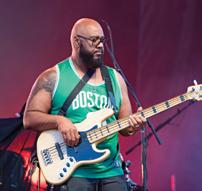
Career resources
Go to career. asu.edu for videos, tips and networking opportunities.
54 SUMMER 2023 GHASSAN ALBALUSHI/ASU
On his best days at work, Mario Liddell feels like a musician who has a chance to perform in front of a big crowd.
Mario Liddell, Bank of America

Next
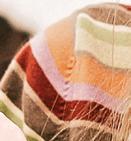
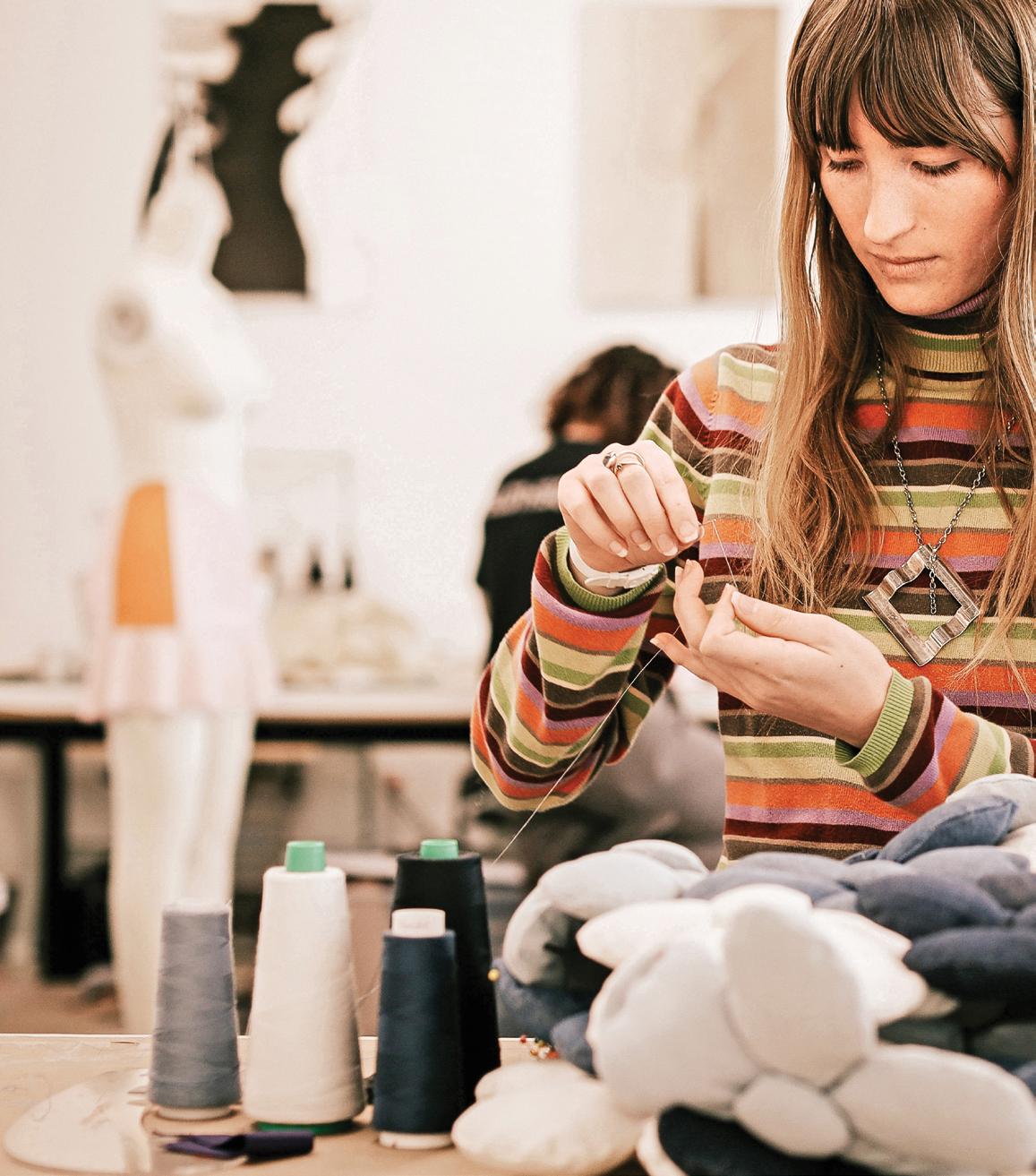
56 SUMMER 2023 INSPIRE
From Montreal to Phoenix to New York, student lands opportunities in a fashion powerhouse
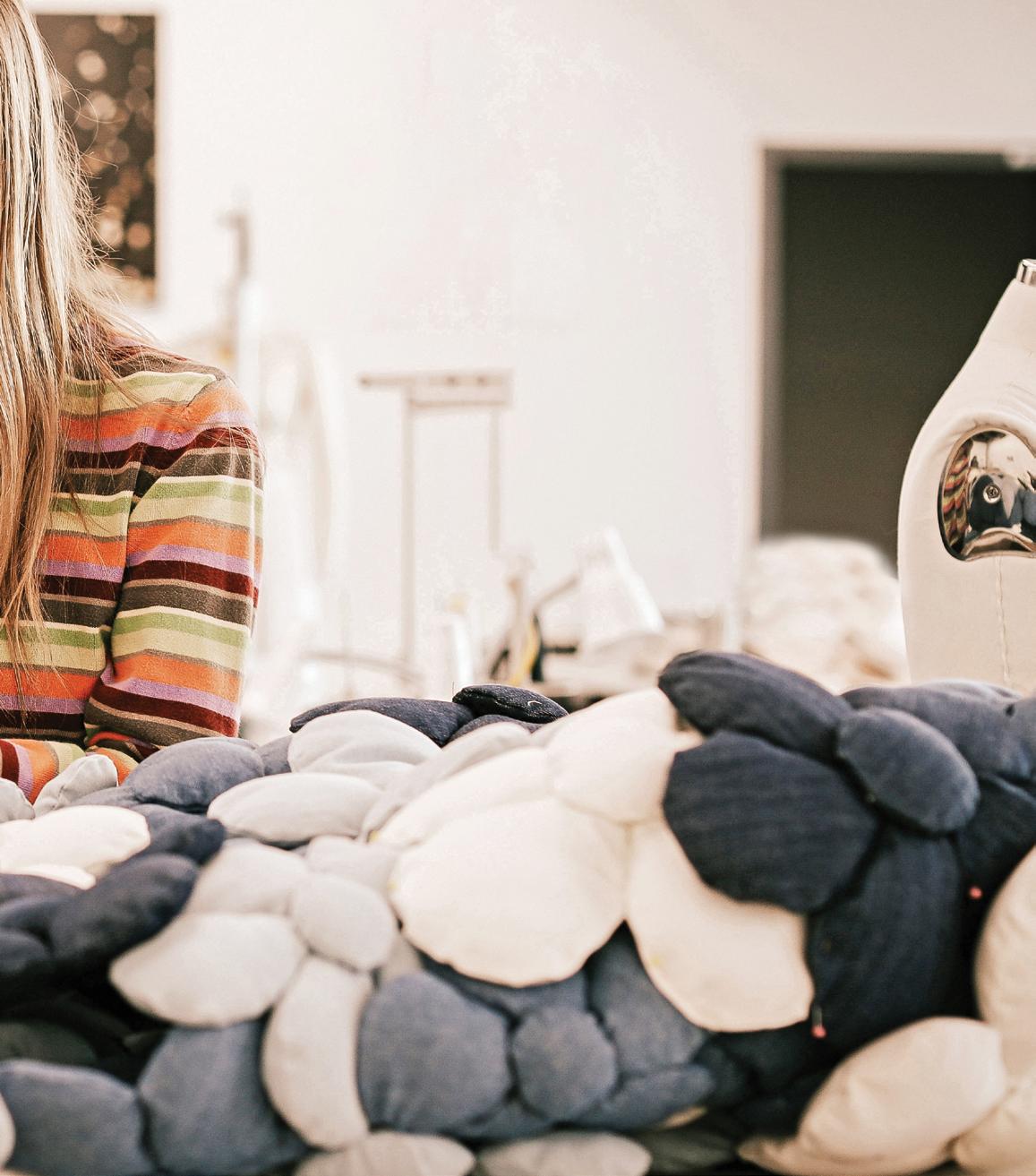
level
ASU THRIVE MAGAZINE 57
Photos by CAMILLE MISTY
Heidi
Stierli
knew from a young age that she wanted to create striking outfits that last, so she did her research on fashion programs around the country. She eventually chose to attend ASU.
Because of the reputation of the program, Stierli, ’23 BA fashion, from Montreal, Canada, selected the university over renowned schools in San Francisco.
“With fashion, my dream is to go into the vintage world, working with famous vintage collectors, putting on events showcasing these treasures,” she says. In addition, “I love painting pottery and canvases in my free time, and also upcycling clothing, thrift shopping and vintage clothing.”
Her biggest passion is ensuring that the clothing she makes lasts, that it can work from season to season and accentuate a wardrobe for years. And she says that ASU has helped her pave her career in this competitive field.
A component of the ASU fashion program and a key differentiator, Stierli says, is teaching students to work with Optitex, an end-to-end fashion design software including 2D CAD/CAM pattern design and 3D prototyping.
She was a student-worker in the fashion program from January 2022 until her graduation and credits her mentorship of students with helping her take her designs to an entirely new level.

“I work with students helping them solve the problems they encounter in their designs. ASU students are a bunch of amazing, creative, innovative artists,” she says.

“With fashion, my dream is to go into the vintage world, working with famous vintage collectors, putting on events showcasing these treasures.”
—HEIDI STIERLI, ’23 BA FASHION
58 SUMMER 2023 HAUTE MEDIA
Heidi Stierli (right), a fashion graduate, and her clothing designs.
One of her biggest opportunities came through an alumna of the program. Claire Cohan, ’21 BA in fashion, helped Stierli land an internship in New York City at the American Dream Team Network International. The fashion powerhouse does licensing of designs, garment production and sends its imports around the world. Stierli says that this internship will open up numerous opportunities in her career.
And, she gets to live and work in New York City, an international fashion center.
“I don’t think I would have been ready for New York City without ASU’s fashion program,” she says. “It provided me with confidence
and a robust skill set.”
She adds, “The fashion program at ASU is so strong because of the professors and faculty, such as Victoria Cook, a role model in pattern making for me, and Irina Tevzadze, who helped me learn what it will be like in the industry.”
Cook, the lead pattern maker, and instructor of Design I and II, has owned her own pattern making business for more than a decade. Tevzadze, a clinical assistant professor, created and internationally showcased numerous collections of womenswear, childrenswear and accessories, and designed collections for high-profile European fashion houses. n
ASU FIDM will have more programs, students, employees in downtown Los Angeles
ASU announced that the Fashion Institute of Design and Merchandising will be part of the expansion of fashion education at the Herberger Institute for Design and the Arts.


ASU’s fashion program will now be named ASU FIDM, incorporating both the FIDM community and campus, and it will operate in both Los Angeles and Phoenix.
ASU FIDM will provide students with enhanced educational opportunities by embedding world-class fashion education within a public research university with global reach. The transition will provide students with access to a renowned faculty with extensive industry experience, and the school will offer career-focused programs and experiences that enable students to have a sustainable and creative impact on the world.
The program will now offer two great locations. Fusion on First in downtown Phoenix is an innovation hub that features a suite of industry-standard studio spaces and recording studios, digital media labs, performance spaces and an interdisciplinary makerspace with laser cutters, 3D printers, felting and industrial knitting machines, and more. The Los Angeles location, embedded in the heart of downtown LA and in close proximity to the fashion district, features study spaces designed to inspire creativity, the largest fashion library on the West Coast, state-of-the-industry classrooms and the renowned FIDM Museum.
Learn more at asufidm .asu.edu .
ASU THRIVE MAGAZINE 59
Sun Devils take top spots at Augusta as Jon Rahm wins Masters and Phil Mickelson ties for 2nd
Alum Jon Rahm carded 12-under par to earn his first Green Jacket in the 87th Masters Tournament in April. Rahm, ’16 BA in communication, won the tournament by four strokes. The win is his second major championship and returned him to World No. 1. He is the first Sun Devil since Phil Mickelson in 2010 — and just the second man in program history — to win the most prestigious tournament in golf. Meanwhile, Mickelson, ’92 BA in psychology, tied for second place, putting two Sun Devils in the top three.
Stay up to date on the Men’s Golf program at thesundevils.com/sports/mens-golf

“When I hit that third shot on the green, and I could tell it was close by the crowd’s reaction, just the wave of emotion of so many things just overtook me.”
— JON RAHM AT THE PRESS CONFERENCE AFTER WINNING THE 2023 MASTERS TOURNAMENT AT AUGUSTA NATIONAL GOLF CLUB
60 SUMMER 2023 ROSS KINNAIRD/GETTY IMAGES
Linn Grant’s dazzling LET rookie season
Former Sun Devil Linn Grant gave us one of the most memorable pro rookie seasons in recent history, establishing herself as one of the top up-and-coming female golfers in the world. Originally from Sweden, Grant came to ASU as a highly touted recruit and immediately lived up to the expectations.
Grant became the first female winner on the DP World Tour, one of the two most competitive pro golf competitions. She also won four times on the Ladies European Tour and topped the season-long Race to Costa Del Sol, becoming the LET champion and the first Sun Devil to win the title since 2012.
Stay up to date on the Women’s Golf program at thesundevils. com/sports/womens-golf

Play like a Sun Devil®
Football schedule
Get ready for this fall’s games.
62 Justin Robinson sets record ASU sprinter leaps to No. 3 in the world.
63
ASU THRIVE MAGAZINE 61 SUN DEVIL ATHLETICS
2023 Football Schedule
AUGUST
31 vs Southern Utah (Thu)

TEMPE, AZ • Frank Kush Field/Sun Devil Stadium
SEPTEMBER
9 vs Oklahoma State (Sat)

TEMPE, AZ • Frank Kush Field/Sun Devil Stadium
16 vs Fresno State (Sat)

TEMPE, AZ • Frank Kush Field/Sun Devil Stadium
23 vs USC (Sat)
TEMPE, AZ • Frank Kush Field/Sun Devil Stadium
30 at California (Sat)
BERKELEY, CA
OCTOBER
7 vs Colorado (Sat)
TEMPE, AZ • Frank Kush Field/Sun Devil Stadium
21 at Washington (Sat)
SEATTLE, WA
28 vs Washington State (Sat)

TEMPE, AZ • Frank Kush Field/Sun Devil Stadium
NOVEMBER
4 at Utah (Sat)
SALT LAKE CITY, UT
11 at UCLA (Sat)
PASADENA, CA
18 vs Oregon (Sat)
TEMPE, AZ • Frank Kush Field/Sun Devil Stadium
25 vs Arizona (Sat)
TEMPE, AZ
• Frank Kush Field/Sun Devil Stadium
See all details of games and ticket options at thesundevils.com

Sun Devil Men’s Swimming and Diving wins Pac-12 championship


For the first time in Men’s Swimming and Diving program history, the Sun Devils became Pac-12 champions, as they put the finishing touches on their magical week in early March. The Sun Devils beat California, Stanford, Arizona, USC and Utah. They won nine times, broke eight program records and never once let go of their clutch of first place after gaining the lead. Here are their six individual wins and three relay wins:
• Léon Marchand, 200 breast, 400 IM, 200 IM, 200 medley relay, 400 medley relay, 800 free relay.
• Zalan Sarkany, 1650 free.
• Grant House, 200 free, 800 free relay, 400 medley relay.
• Jack Dolan, 50 free, 200 medley relay, 400 medley relay.
• Max McCusker, 200 medley relay, 400 medley relay.
• Jonny Kulow, 200 medley relay.
• Patrick Sammon, 800 free relay.
• Julian Hill, 800 free relay.
62 SUMMER 2023 VS SUN DEVIL ATHLETICS
Tennis player Roi Ginat chose ASU over going pro

Freshman Roi Ginat is one of two new players on the ASU Men’s Tennis team. Starting young, Ginat picked the sport up quickly and became one of the best junior players in Israel and the world, ranking as high as 149th in the International Tennis Federation junior world rankings. After high school, Ginat looked forward to playing more tennis and wanted to go pro, but first, he had to join the Israeli military.
During his service, Ginat trained several hours a day and competed in tennis inside and outside the country. Then ASU Coach Matt Hill recruited him to ASU. Even though Ginat had a strong desire to directly go on the pro circuit, he eventually decided that ASU was his best option and that college tennis would help him grow more. The 21-year-old had little difficulty fitting in, despite having so much to adjust to in his new daily life.
“Getting to know myself better is what I want to do, and getting to know as many people as I can,” Ginat says. “I want to make new friends, be influential for as many people as I can watching me and enjoy the time and the moments because it’s not gonna be the same when I get older.”
Men’s and Women’s Cross Country teams earn All-Academic honors
Sun Devil Cross Country programs earned USTFCCCA All-Academic honors for both the men’s and women’s teams, the U.S. Track & Field and Cross Country Coaches Association announced.
ASU’s men’s program recorded a 3.05 GPA, while the women earned a 3.73.
It’s the eighth time in the past decade that both teams collected the honor. In order to qualify for All-Academic distinction, teams must have a cumulative GPA of 3.0 on a 4.0 scale.
Robinson crushes 400m record — twice
ASU sprinter Justin Robinson claimed gold and twice shattered the ASU men’s 400m indoor record at the United States Track and Field Indoor Championships in New Mexico in February. Robinson opened the meet with a 45.48 in prelims, besting Jason Barton’s 45.56 record from 2004. Robinson then ran a 45.40 in the 400m finals to break his own record, win the gold medal, and record the third-fastest 400m time among senior men that season. It is the second school record Robinson was a part of over the winter, as he helped ASU’s 4x400 relay squad run a program-best 3:03.09 on Feb. 11 at the Tyson Invitational in Arkansas.
— Logan Stanley, State Press senior reporter, a graduate student in the master of arts in sports journalism program
 – Vinny Deangelis, State Press reporter, junior at the Walter Cronkite School of Journalism and Mass Communication
ASU Men’s Tennis player Roi Ginat.
– Vinny Deangelis, State Press reporter, junior at the Walter Cronkite School of Journalism and Mass Communication
ASU Men’s Tennis player Roi Ginat.
Keep up with the Sun Devils’ latest news and events at thesundevils.com .
ASU THRIVE MAGAZINE 63 SUN DEVIL ATHLETICS
ASU sprinter Justin Robinson.
A rendering guided the initial vision of what is now the ASU West campus.


1980s
Then Now
GO WEST
Committed to supporting the 15 communities that make up more than 50% of Maricopa County’s future growth, ASU’s West campus was built in 1984 — nearly 40 years ago. Today, ASU’s West campus is continuing to expand and blends a liberal arts education with 21st-century workforce preparation. Explore it at campus.asu. edu/west.
2023
64 SUMMER 2023 RENDERING COURTESY OF UNIVERSITY ARCHIVES, ASU LIBRARY; DRONE PHOTO BY SAMANTHA CHOW/ASU GROW
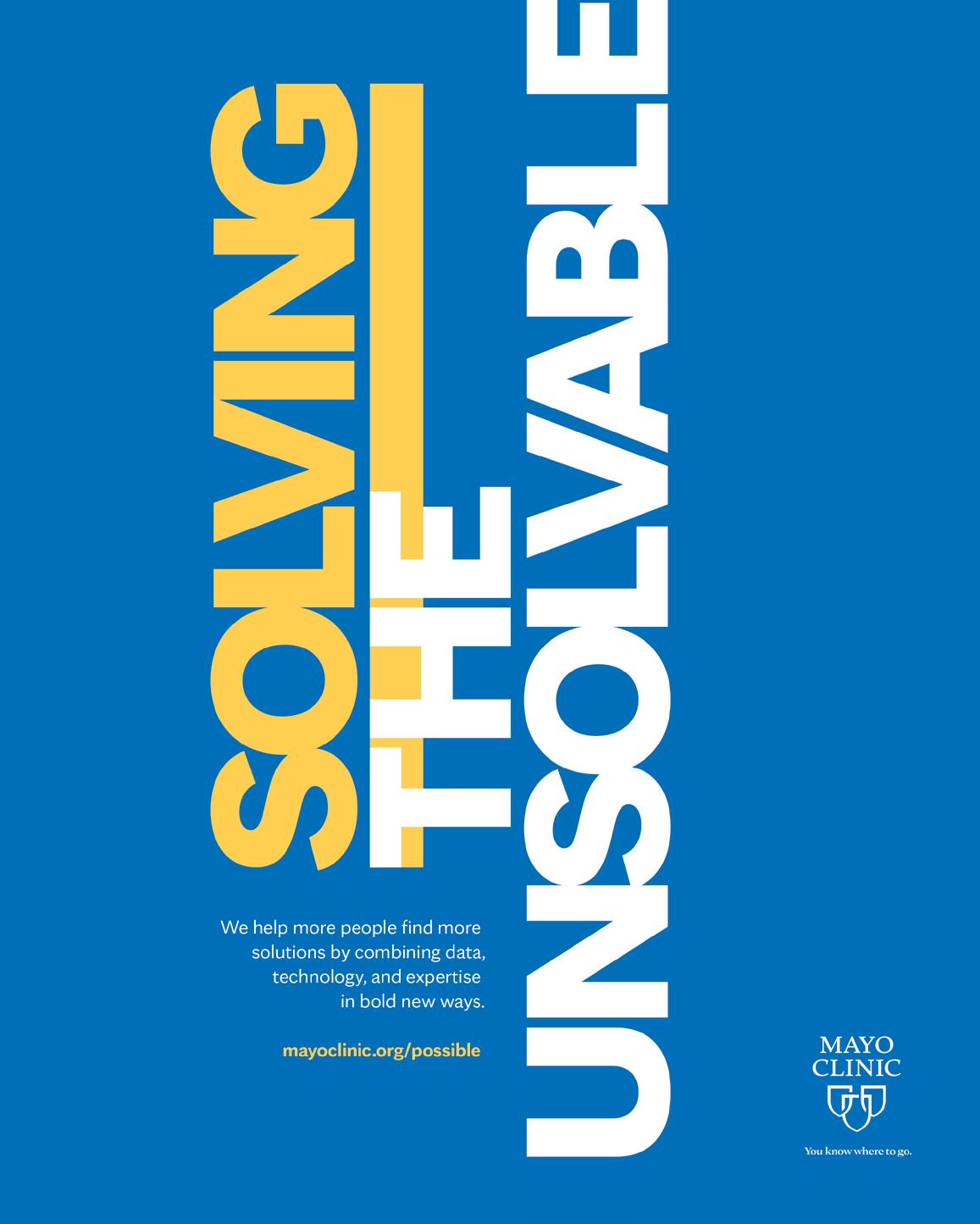
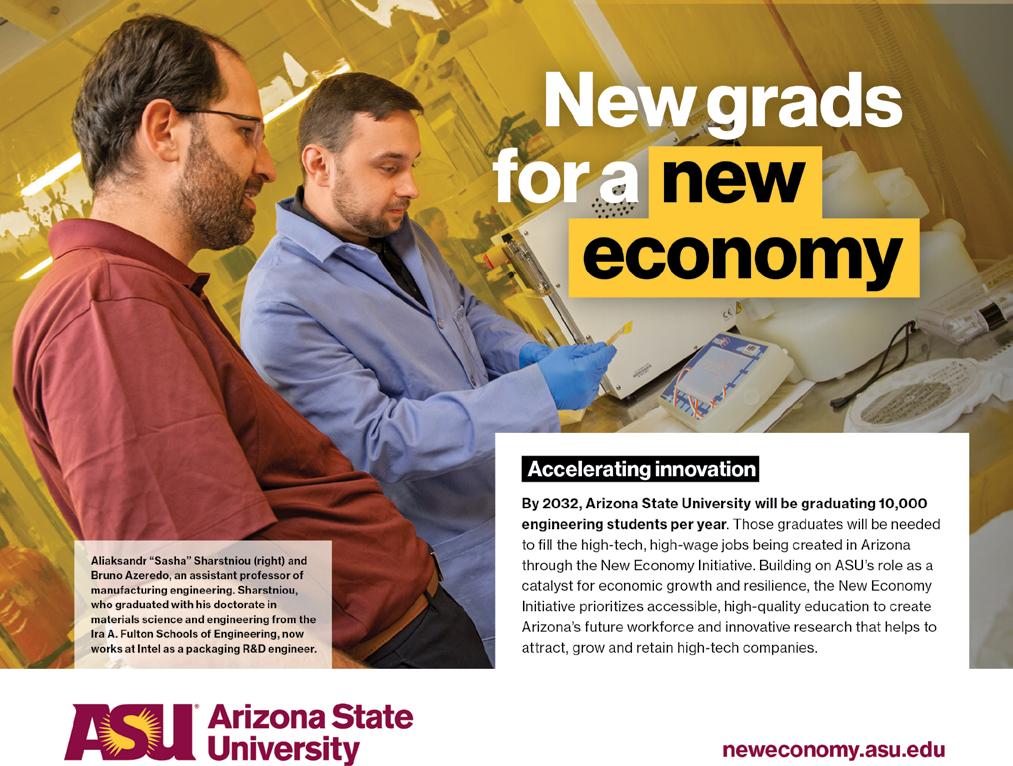
Arizona State University, ASU Thrive Magazine PO Box 875011, Tempe, AZ 85287-5011













































 B Y RENAE HINTZE, ’17 BA; OMAR MOTA, ’19 BSD; KAITLYN MATTHEWS, ’21 BA JOURNALISM AND MASS COMMUNICATION; JORDAN MOFFAT, ’21 BA SPORTS JOURNALISM; RAINI-SKYE ROGERS, GRADUATING SENIOR IN GRAPHIC DESIGN
B Y RENAE HINTZE, ’17 BA; OMAR MOTA, ’19 BSD; KAITLYN MATTHEWS, ’21 BA JOURNALISM AND MASS COMMUNICATION; JORDAN MOFFAT, ’21 BA SPORTS JOURNALISM; RAINI-SKYE ROGERS, GRADUATING SENIOR IN GRAPHIC DESIGN

































































 – Vinny Deangelis, State Press reporter, junior at the Walter Cronkite School of Journalism and Mass Communication
ASU Men’s Tennis player Roi Ginat.
– Vinny Deangelis, State Press reporter, junior at the Walter Cronkite School of Journalism and Mass Communication
ASU Men’s Tennis player Roi Ginat.




